
PLUS ❯ Succession planning ❯ Payment with Bitcoin ❯ Apps for recovery SPRING 2018 • VOL. 39, NO. 2 • WWW.BEHAVIORAL.NET MARKETING STANDARDS EMERGE — Page 16 YOUR
HOW TO
Part of the addiction treatment and recovery community for more than two decades, Dominion Diagnostics delivers the most sophisticated, actionable clinical information to treatment professionals, and supports them with the latest technologies and best education available as they work to improve outcomes.




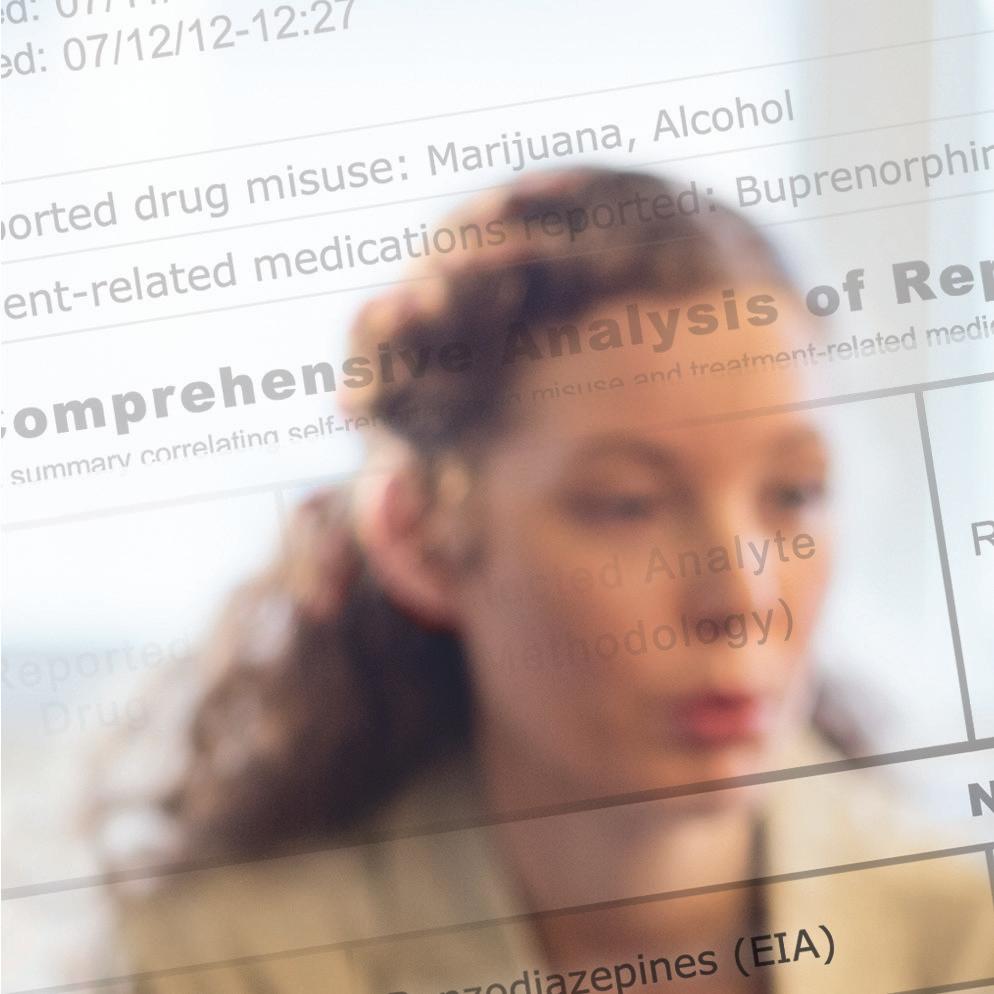
Learn more about Dominion Diagnostics online at: www.dominiondiagnostics.com | @domdiag

2018 Title Sponsor National Conference on Addiction Disorders
recovery
in
based on
research, and trust
Furthering
by engaging clinicians
conversations
analytics, cutting-edge
BestCare® LIGATURE-RESISTANT fixtures ultimately reduce ligature points to ensure a safer and more secure behavioral healthcare environment.
DO YOU SEE THE LIGATURE POINTS? LIGATURE POINTS IN A TYPICAL BATHROOM

In traditional restroom applications, ligature points are more common than you might realize. The arrows above indicate dangerous ligature points in existing bathrooms.
Did you know? Most inpatient suicides occur in the facilities bathrooms.

6 4 5 1 2 3 7 9 8 11 12 10 3 9
1. Showers
2. Soap Dishes
3. Grab Bars
4. Sinks
5. Shelves
6. Mirrors
7. Paper Towel Dispensers
8. Tank Style Toilets
9. Towel/Clothes Hooks
10. Spindle-less Toilet Paper Holders
11. Linear Drains
TYPICAL BESTCARE® LIGATURE-RESISTANT PLUMBING FIXTURES & ACCESSORIES
12. Floor Drains
RENOVATE / DESIGN YOUR NEW BATHROOM
FOR MORE INFORMATION: whitehallmfg.com •1-800-782-7706
EDITORIAL
Editor in Chief Julie Miller (216) 373-1204 • jmiller@iahbhc.com
Senior Editor Tom Valentino (216) 373-1225 • tvalentino@iabhc.com

DESIGN
Creative Director Dave Villafañe
SALES
Director of the Institute for the Advancement of Behavioral Healthcare
Douglas J. Edwards (216) 373-1201 • dedwards@iabhc.com
Please send IOs to adtraffic@vendomegrp.com All ad materials should be sent electronically to: https://vendome.sendmyad.com/
CUSTOMER SERVICE/SUBSCRIPTIONS
Call: 1-888-244-5310, email to: VendomeHM@emailpsa.com, or visit: www.iadvancebehavioralhealthcare.com/subscribe
REUSE PERMISSIONS
Copyright Clearance Center info@copyright.com Ph: 978-750-8400
Fax: 978-646-8600
ADMINISTRATION
Chief Executive Officer Jane Butler
Chief Marketing Officer Dan Melore
Vice President, Finance Bill Newberry
Vice President, Custom Media Jennifer Turney
Director, Circulation Rachel Beneventi
Behavioral Healthcare Executive (ISSN 1931-7093, Online
2167-9649) is published four times per year by Vendome Group, LLC, 237 West 35th St., 16th Floor, New York, NY 10001. ©2018 by Vendome Group.
Behavioral Healthcare Executive is a trademark of Vendome Group, LLC. All rights reserved. No part of Behavioral Healthcare Executive may be reproduced, distributed, transmitted, displayed, published, or broadcast in any form or in any media without prior written permission of the publisher. To request permission to reuse this content in any form, including distribution in educational, professional, or promotional contexts or to reproduce material in new works, please contact the Copyright Clearance Center at info@copyright.com or 978.750.8400
EDITORIAL: Behavioral Healthcare Executive is the practical resource for intelligence that executives can apply to meet current leadership, financial, clinical, technology, and compliance needs. Behavioral Healthcare Executive is indexed in the National Library of Medicine’s MEDLINE/ PubMed database. Articles and opinions published in Behavioral Healthcare Executive do not necessarily reflect the views of Vendome Group or the Editorial Advisory Board.
SUBSCRIPTIONS: For questions about a subscription or to subscribe, please contact us by phone: 888-244-5310, online: http://www.iadvance behavioralhealthcare.com/subscribe or email: VendomeHM@emailpsa. com. Subscription rate per year: $140 domestic, $169 outside the US. Single copies and back issues: $20 Domestic, $32 outside the US.
POSTMASTER: Send changes of address to: Behavioral Healthcare Executive, PO Box 11404, Newark NJ 07101-4014.
CONTENTS | SPRING 2018 2 SPRING 2018 BEHAVIORAL HEALTHCARE EXECUTIVE WWW.BEHAVIORAL.NET IN THIS ISSUE EDITOR'S LETTER 6 While opioids are getting a fair share of attention, don’t forget that alcohol is still a serious issue
PERSPECTIVES 12 Have treatment options ready for patients in the golden moment BY DENI CARISE MANAGEMENT 14 Succession plans smooth the road during mergers and acquisitions BY JILL SEDERSTROM 16 New marketing standards polish the industr y’s image BY TOM VALENTINO TECHNOLOGY 18 Cr yptocurrencies might be catching on BY TOM VALENTINO 22 Consider the costs and benefits of patient apps BY BRIAN ALBRIGHT NEED TO KNOW 25 Half of America says addiction is a disease BY JULIE MILLER DESIGN FOCUS 28 The Unity Center, Portland, Oregon BY JILL SEDERSTROM COVER STORY Private equity isn’t the only option for owners looking to cash in on market trends BY JULIE MILLER 8
BY JULIE MILLER
ProgressEvaluationNote









Scheduling & To-Do Lists


Optimize how you manage appointments, notes, and billing. Your To-Do list automatically keeps track of notes you need to write, pending billing actions, and much more. Sync your calendar to your smart phone to view your schedule on the go.
Electronic Billing













Streamline your billing with seamlessly integrated electronic insurance claims, ERA payment posting, credit card processing, and more. Submit insurance claims with a single click. Easily generate patient statements, superbills, revenue reports, and more.




View Features and Sign Up Today at www.TherapyNotes.com My experience with TherapyNotes has been fantastic! Firstly, the system is easy to navigate, thorough, flexible, and extremely clinically
technical and customer support has been efficient, fast, and
personal. I am leaving another EHR system for TherapyNotes...gladly. I'm very happy that you've created such a quality product. Thank you! Dr. Christina Zampitella, FT, Licensed Clinical Psychologist Many more stories on TherapyNotes.com! Special Offer! Just for Addiction Professional and Behavioral Healthcare Executive Readers! Sign Up and Receive Your First 2 Months FREE! Use Promo Code: ADPMAY17 Offer Expires 8/1/18 Cloud-Based SOFTWAR E iPad Mac Windows Robust Notes & EMR Document your clients’ growth with powerful form-based notes, each uniquely designed for behavioral health. Go paperless by uploading your patient files into TherapyNotes. All of your data is secure,
and backed up automatically. Automatic Reminders Automatic text, phone, and email reminders to reduce no-shows and decrease expenses Custom Client Portal TherapyPortal, your own custom client portal for appointment requests Unlimited Support Superior, unlimited phone and email support included with your TherapyNotes account ...AND MANY MORE FEATURES!
intuitive. Secondly,
very
encrypted,
11:30AM Appt with Kyle Called in to say he may be a little late Appt with Kyle 12:00PM Appt with Susan Remember to collect paperwork Appt with Susan Create a Progress Note for your appointment on 4/16 appointment on 4/16
Claim for John with Acme 12/2 $10090791 12/9 $7590832 https://www.therapynotes.com Acme Insurance Company Submit Claims
Diagnosis: Presenting Problem: Treatment Goals: Electronically Sign this Note Treatment Plan DSM-5 anxiety Online Practice Management Software for Behavioral Health Therapy
Notes
RESULTS! NOT PROMISES.
Since 1987, Brown Consulting, Ltd. has assisted hundreds of mental health and addictions treatment organizations in successfully reaching their goals. We provide a full range of consulting services. Specialist in Regulatory Compliance.

The National Conference on Addiction Disorders and its concurrent Executive Program is the premier, respected, and trusted national conference that brings together professionals of all types to discuss emerging and best practices on the prevention, intervention, treatment, and recovery management of addictions and co-occurring disorders. New this year is the course to earn a Certificate in Addiction Treatment Marketing.
The National Cocaine, Meth & Stimulant Summit brings together multiple stakeholders
larger societal discussions about addressing drug use. https://vendome.swoogo.com/stimulant-summit
December 10-12, 2018
Treatment Center Investment & Valuation Retreat
Scottsdale, Arizona
The Treatment Center Investment & Valuation Retreat brings together owners and senior executives from the addiction treatment and recovery community to meet with key members of the investment and financial community for an exclusive three-day educational, business and networking event. https://vendome.swoogo.com/TCIV-2018
MORE!
Visit www.behavioral.net/panelseries for regional events in the following locations:
4 SPRING 2018 BEHAVIORAL HEALTHCARE EXECUTIVE WWW.BEHAVIORAL.NET CALENDAR
Join the conversations about the business
Pittsburgh Chicago Denver Cincinnati Phoenix Austin Minneapolis Orange County, Calif. Boca Raton, Fla. DANBROWNCONSULTING.COM LEARN MORE.
Give us a call today! 1-800-495-6786
Pages Pages Alkermes CVR3 Brown Consulting, LTD 5 Credible Behavioral Health Software ................ CVR4, 20,21 Dominion Diagnostics CVR2 Dreamscape 29 Furniture Concepts 30 Mattress Firm 23 Mertz Taggart 5 Nextgen Healthcare 7 Recovery Brands LLC 13 SAS Group 11 Stoneridge Partners 13 Therapy Notes 3 Whitehall Manufacturing ....................................................... 1
INDEX
ADVERTISER
The Treatment Center Investment & Valuation Retreat is the premier event for executives who want to grow, invest in, and transform their businesses, and offers a series of panel discussions, expert presentations, and formal and informal networking opportunities.

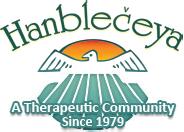



SCOTTSDALE, AZ DEC 10-12, 2018 OMNI SCOTTSDALE RESORT AND SPA AT MONTELUCIA Register now at www.TreatmentCenterRetreat.com/2018
INVESTING IN ADDICTION TREATMENT AND RECOVERY
REGISTER TODAY
Alcohol misuse still outweighs opioid misuse
Federal lawmakers are filling their political ledgers with proposals to address the opioid crisis. In fact, federal appropriations for 2018 included about $4 billion worth of new investment in everything from prevention to treatment to the development of devices to test overseas packages for fentanyl.
The focus on opioids is well directed. However—always being the advocate for the underdog—I hope that in our opioid anxiety, we don’t cheat the programs that support individuals with alcohol use disorders.
We can’t assume that new policies addressing opioid addiction will consequently benefit those with alcohol issues too. Any clinician will tell you that an individual misusing alcohol has distinctly different care needs than someone who has been using heroin. Not only are the programs discrete, but in terms of raw numbers, the need for treatment is actually greater when it comes to alcohol.
Twice the number of Americans report alcohol issues as those reporting drug issues. The National Survey on Drug Use and Health finds that an estimated 15.1 million people had an alcohol use disorder in 2016, compared with 7.4 million people who had an illicit drug use disorder—a figure that includes misuse of prescription opioids.
Unfortunately, the prevalence of alcohol-related issues hasn’t been improving.
Alcohol-induced deaths increased 37% between 2000 and 2015, with 33,200 deaths in 2015 alone, according to the Trust for America’s Health. The National Institute on Alcohol Abuse and Alcoholism recently found the rate of emergency room visits related to chronic alcohol consumption increased 58% between 2006 and 2014. And as a nation, we’re consuming 17.5 billion binge drinks a year, according to a Centers for Disease Control and Prevention study.
Alcohol use is still a serious issue, and one that shouldn’t be shortchanged as attention is directed toward the opioid crisis.
ADVISORY BOARD
David Chernof, MSW, LCSW, MBA
Consultant, Behavioral Help, LLC; Associate Clinical Director, Queen of Peace Center
Patrick Gauthier
Director, AHP Healthcare Solutions

Nancy Hale
Program Director, Operation UNITE
Andrew Kessler Founder and Principal, Slingshot Solutions
Jean Krisle
Founder and CEO, 10,000 Beds
Edward R. Jones, PhD
Senior VP for Strategic Planning, Institute for Health and Productivity Management
Ron Manderscheid, PhD
Executive Director, National Association of County Behavioral Health and Developmental Disability Directors
Steven Millette Director, Gloo Inc.
Linda Rosenberg
President/CEO, the National Council on Behavioral Health
Raymond Tamasi
President, Gosnold on Cape Cod
Doug Tieman President/CEO, Caron Treatment Centers
Mary Woods CEO, WestBridge
New micro-grants are available from the Institute for the Advancement of Behavioral Healthcare at iadvancebehavioralhealthcare.com.
Julie Miller, Editor-in-Chief
Award Winner

LETTER FROM THE EDITOR 6 SPRING 2018 BEHAVIORAL HEALTHCARE EXECUTIVE WWW.BEHAVIORAL.NET
APPLY NOW!
American Society of Business Publication Editors 2018 Regional
T
A | S | B | P | E Fostering B2 B editoria excellence
PR IN
TECHNOLOGY THAT ADVANCES BEHAVIORAL HEALTH IS GOOD.

A PARTNER WHO HELPS YOU ACHIEVE YOUR GOALS IS BETTER.
The Affordable Care Act has greatly expanded coverage for mental health and substance use disorders—though its future may be unclear, what is clear is the demand for behavioral care. NextGen Healthcare helps meet this demand by providing one interoperable record. Integrating clients’ history of progress, medications, trials, and treatment plans—regardless of location, our tailored solutions enable you to holistically treat each client and save time, while achieving peace of mind.
Learn more at www.nextgen.com/betterbehavioralhealth
Copyright © 2018 QSI Management, LLC. All Rights Reserved. NextGen is a registered trademark of QSI Management, LLC. All other names and marks are the property of their respective owners.
REMODEL
 BY JULIE MILLER
BY JULIE MILLER
8 SPRING 2018 BEHAVIORAL HEALTHCARE EXECUTIVE WWW.BEHAVIORAL.NET
YOUR
COVER STORY
There’s no doubt that the business of behavioral healthcare is changing. What was once a cottage industry has transformed into an investment opportunity for entrepreneurs and financiers alike. Not unlike the situation witnessed by primary care providers a decade ago, behavioral health organizations are considering mergers, acquisitions and ample opportunities to sell the practices that many have built with their own two hands.
The emerging, lesser-known options for structuring an enterprise can have treatment center owners wondering if it’s time for a change. Even more so, many are wondering if change is even a good thing.
“The treatment field used to be made up of boutique programs—family-owned and operated and closely held small businesses—and about 10 years ago, behavioral health companies started gobbling up the crown jewels,” says Jane Mintz, MA, PC, BCPC, CIP, chief clinical strategist and CEO of Realife Intervention Solutions.
Mintz says the tug of war between profitability sought by strategic owners and mission fulfillment sought by family owners has been detrimental to the industry overall. The business lens and the clinical lens provide two truly different perspectives.
She’s concerned about a cultural shift that puts business ahead of clinical quality because it not only hurts patients, it leads to a lack of reverence for the history of the field. Established treatment centers have been doing life-saving work—in some cases for a century or more—and they now compete with corporate players that have recently arrived to capitalize on market opportunity.
However, private equity (PE) has a vested interest in building the best of the best, and maintaining quality is typically seen as a competitive advantage.
“Where those providers have clinical excellence, that’s where they’re going to win,” says Patrick Pilch, managing director and national leader of the BDO Center for Healthcare Excellence & Innovation. “And that’s certainly where the PE investors are going to go.”
INVESTORS CIRCLE
The fragmented and undercapitalized behavioral health market represents about $35 billion of the $3.3 trillion U.S. healthcare system, and many successful facility owners have been approached by PE firms looking for acquisitions. PE is often seeking to make initial platform deals or buy up smaller providers that serve as complementary add-ons to the portfolio. In most cases, the goal for PE transactions is to build up an enterprise with scale.
And capital investment leads to accelerated expansion.
“The big players are going to get bigger,” says Pilch. “Even then, if you’re talking about two years from now, it’s still going to be surprisingly fragmented. It will take time to do the rollup that’s required to get to scale.”
As one example of rapid growth, BayMark Health Services now holds 167 programs in 26 states and Canada. BayMark was formed just three years ago from the merger of two medication assisted treatment outfits: BAART Programs—launched in 1977 by a San Francisco family—and MedMark Treatment Centers—a primary care provider that expanded into addiction treatment in 2006. BayMark has been backed by Webster Capital since 2015.
Beyond an outright sale to private equity, which remains the biggest deal opportunity according to Pilch, there are some lesser-known business structures that behavioral health owners might consider. While far from being considered trends, a few unique options are emerging.
MANAGEMENT SERVICES ORGANIZATIONS

Some family-owned treatment centers might reach a point where they begin to feel a little too successful. As the logistics of running a booming business overtake mission-driven work, owners might consider off-loading the administrative burdens to an outsourced partner. Management services organization (MSOs) could be such partners.
MSOs have a fresh foothold in other healthcare segments and in time could represent an opportunity for behavioral health enterprises as well.
For example, in 1994, a team of physicians formed Network Medical Management, and it has gone on to become one of the largest MSOs in the country, handling everything from case management to accounting to marketing, while the clinicians remain solely in charge of care delivery.
Pilch says he fully expects MSOs to begin surfacing in behavioral health in the next year.
“Where the provision of care is great—you’ve got a great clinical enterprise but the back office is not as strong, not as efficient—that’s where it’s ripe for opportunity,” he says.
If a collection of 10 operators would get together to combine their administrative functions, for example, they could have enough scale to separate the back office from the clinical side. Even a not-for-profit provider could structure a foundation model with a for-profit MSO, Pilch says.
“If these MSOs come in, I’d like to see if they could take the back-end business away and put more money into clinical service or clinical training because that’s where we’re letting people down today,” Mintz says.
WWW.BEHAVIORAL.NET 9
EMPLOYEE STOCK OWNERSHIP PLANS
Many small-business owners want to see their corporate vision continue after they’ve retired. A trust might provide an option to maintain an owner’s legacy.
An employee stock ownership plan (ESOP) is a retirement plan, much like a 401(k). However, its structure allows a company’s stock to be held in a trust for employees. Employees can have shares of stock allocated to their accounts as a benefit.
For the original owner of the business, an ESOP can be a gradual or complete exit strategy in lieu of selling the company to a third party.
“The trust is allowed to pay fair market value for the stock, so it can be a great liquidity vehicle for an owner, while preserving the culture of the business,” says Michael McGinley, director, Prairie Capital Advisors.
McGinley says the treatment center owner essentially sells stock to the trust, and the trust can then borrow money—from a bank, for example—to pay for that stock. As the debt is repaid, an increasing amount of stock would be allocated to the employees who participate in the ESOP.
Employees are granted shares as a benefit, often with no required investment of their own money. Additionally, McGinley says employees are more likely to stay with a company when they share in its financial success.
“This is a way to financially reward employees, and it becomes a retention tool to help keep people employed because they get such significant financial benefits through their sweat equity that they’re putting into the company,” he says.
ESOPs are all about equity.
Profit accrues to the value of the shares, and that value is allocated to the employees over time. Then when each employee leaves or retires from the company, the ESOP buys back the shares, according to IRS rules. That’s when the “money on paper” becomes money in the pocket of employees.
“It’s an extremely powerful ownership structure where all of the value of the company flows to the employees,” McGinley says.
He recommends at least $1 million in annual cash flow as a minimum requirement to begin an ESOP structure. From there, setting up a trust and securing the loan would be the next steps.
There are specific tax advantages for ESOPs as well. In some cases, the owner doesn’t pay capital gains tax, and the business doesn’t pay income tax.
In one example, Cornerstone Treatment Facilities of New York, a 40-year-old addiction treatment program with two centers and about 300 beds, opted for an ESOP.
The organization faced significant regulatory and licensing restrictions for the ownership of the business and didn’t see any viable buyers in the market. The ESOP allowed for an exit strategy while preserving the company’s mission.
ESOPs have a foothold in a number of industries including manufacturing, construction and other healthcare segments. McGinley says he could see ESOPs becoming a trend in the future for behavioral health.
REAL ESTATE INVESTMENT TRUSTS
There are a few real estate investment trusts (REITs) operating in the behavioral health segment today. Simply put, instead of directly owning buildings and the parcels they stand on, behavioral health organizations can opt to sell the real estate and then lease the space back. The provider becomes a tenant rather than an owner of the property it operates.
With a REIT, only the real estate is sold, while the organization continues to offer services just as it always has.
Among the benefits of selling to a REIT is that the deal offers the provider a source of capital, unlocking the equity that’s been built up in the real estate. In addition, the treatment center can still continue to treat patients and expand services as needed.
In one example, AAC Holdings sold two standalone outpatient facilities and two sober living facilities in Las Vegas and Arlington, Texas, to MedEquities Realty Trust in August 2017. Concurrently with the sale, the REIT began leasing the facilities back to AAC.
FUTURE OUTLOOK
One common denominator in all of the business structures available is the need for solid leadership. An established management team is particularly attractive for PE firms, and most look to keep incumbent leaders in place to run the daily operations after the deal closes. Once MSOs gain traction, executives will be needed to drive big-picture strategies.
For Mintz, she remains concerned that the historical success stories of the treatment industry with be lost in the corporatizing of the businesses.
“It’s great that there’s an exit strategy for family-owned businesses—with a big payoff,” she says. “But it’s rare that you don’t see an eventual ‘sanitizing’ of these wonderful, concierge, boutique programs. There are so few left.”
10 SPRING 2018 BEHAVIORAL HEALTHCARE EXECUTIVE WWW.BEHAVIORAL.NET
COVER STORY
Julie Miller is Editor in Chief of Behavioral Healthcare Executive.



WHAT WOULD OWNING A LAB MEAN FOR YOUR TREATMENT CENTER? There comes a time in the life cycle of an Addiction Treatment Center when it must consider all options for handling lab work. Find out at www.SASGroupLLC.com Or call 844.522.6468
Seize golden moments
Be prepared with 24/7 access to treatment
n emergency medicine, the golden hour refers to the hour following traumatic injury during which prompt medical treatment may prevent death. I want to suggest that with substance use disorders (SUDs), we don’t have that golden hour. We only have a “golden moment.”
It’s the precise moment in time when someone is willing to get into treatment. As with other chronic diseases, the earlier treatment is offered in the disease process, the greater the likelihood of positive outcomes. And sadly, these days, one more high can have lethal consequences.
We must seize the opportunity of the golden moment to help individuals with SUD or addiction. This effort requires a multipronged approach, including: increasing immediate access; reducing stigma; and raising awareness of the value of addiction treatment.

At this point in time, we are dealing with a shortage of quality addiction treatment programs. Individuals struggling with SUD who have worked up the courage to seek treatment are being placed on waiting lists, leading some to give up on treatment altogether and continue using, while prompting others to view shortterm sobriety during the waiting period as proof they do not need treatment.
Research from the National Institutes of Health indicates that the longer the delay between the initial phone contact and a scheduled first appointment, the
BY DENI CARISE, PHD
less likely a client is to attend an appointment. One possible reason may be that clients are often in crisis when contacting the agency, and that crisis subsides after a time. Another possibility is that clients may have only temporarily overcome internal or external barriers to treatment, including stigma.
Treatment programs can and should be able to admit clients 24 hours a day, seven days a week. Ideally, they should have interventionists on-call and 24/7 nursing staff if they offer detox as well. Being prepared for someone’s golden moment could mean life or death.
The idea that addiction is simply a moral failing or weakness is patently false. It’s time we erase the stigma that can so often be a huge barrier to treatment and negatively impact someone’s recovery from the disease.
Family and friends can play critical roles in eliminating stigma, getting their loved ones into treatment during that golden moment, and motivating individuals with SUD to stay in treatment. Communities must encourage prevention and increase awareness of treatment options. Police departments and law enforcement have helped the effort by encouraging treatment over jail, and even finding shelter and treatment for those they serve. Emergency room clinicians, as they get people into treatment after an overdose, have seized that golden moment in what some term the “warm handoff.”
Increasing access to treatment, erasing the stigma of addiction, and rallying allies for support can all positively impact an individual’s golden moment and the likelihood that someone with SUD will get treatment and go on to a life of meaningful recovery. These activities have shown that each and every one of us can play a role in saving a life and ending our current drug epidemic. What else can you do today?
PERSPECTIVES 12 SPRING 2018 BEHAVIORAL HEALTHCARE EXECUTIVE WWW.BEHAVIORAL.NET
Deni Carise, PhD, is a nationally recognized expert in addiction treatment and chief scientific officer for Recovery Centers of America.
Client Testimonial


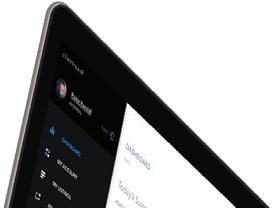




“As a smaller facility focused on providing quality care, I love the flexibility that ClientReach offers. I can turn my campaign on and off at any point and rest assured that I’m getting great results while having the time to focus on what we do best — help clients succeed in their recovery.” —
For more follow us on Social Media @RecoveryBrands

We've helped 80,000+ people impacted by addiction reach out to 400+ treatment providers using our ClientReach platform. Is your facility ready to make a bigger impact and help the lives of people reaching out for treatment? Contact a member of our team at 1-877-792-9312 or email marketing@recoverybrands.com by
AION Recovery
Succession planning pivotal in M&A era
More transactions lead to more leadership shifts
ccording to the Behavioral Healthcare Executive workforce survey conducted earlier this year, just over half of treatment center organization respondents say they don’t have succession plans in place. Experts believe succession planning can better prepare businesses to quickly adapt to an ever-evolving market.
Priming the next group of leaders has also been found to improve employee morale and reduce turnover.
“The succession plan is to ensure we are ready for the things that we don’t have control over,” says Brian Thorn, JD, chief operations officer for Foundations Recovery Network.
His organization has a succession plan in place for each leadership position in operations.
“I have my team constantly identifying where they can be more buttoned-up on succession planning for themselves, as well as for their senior leaders within each company,” Thorn says.
Securing leadership roles is especially important today because analysts are reporting merger and acquisition activity continues to surge in behavioral healthcare. According to the Braff Group, deal trends are up, with substance use disorder treatment organizations alone completing 201 transactions between 2014 and 2017.
BY JILL SEDERSTROM
“When there are mergers, the expectations change,” says Chris Diamond, chief executive officer at Sunspire Health.
In 2016, Kohlberg & Company acquired Meadows Behavioral Healthcare and created the parent holding company Alita Care, LLC, which operates both Meadows and Sunspire Health. Sunspire itself had been acquired by Kohlberg & Company just a year before.
“We had to merge a lot of those expectations together, and the main thing for me—related to leadership plans—was rounding out my leadership teams with folks that now would be able to fulfill the needs of this new organization,” Diamond says.
Sunspire Health serves eight states, so Diamond says he always needs executives with a broad level of experience who can think in terms of larger networks and more robust service offerings.
With any enterprise change, natural attrition is another factor that influences leadership plans. According Diamond, executive leadership tends to turnover about every six to seven years in the behavioral health space.
“It’s our expectation to deal with that,” he says, adding that Sunspire has a succession plan as well as manager training.
STRATEGIES TO FOSTER STRONG MANAGEMENT
Experts advise organizations aim to continuously create and train new leaders in an organization.
Michelle Maloney, MS, LPC, CAADC, CAP, regional vice president of operations for Sunspire Health, researched behavioral health hiring strategies for a doctorate degree. After gathering input from 28 organizations, some general trends began to emerge about what strategies work best to groom future leaders. For instance, Maloney found that having formalized hiring strategies and succession processes worked better to manage current employee expectations and ensure that a talent pool of qualified individuals existed within an organization.
14 SPRING 2018 BEHAVIORAL HEALTHCARE EXECUTIVE WWW.BEHAVIORAL.NET MANAGEMENT
Informal processes tended to lead to employee dissatisfaction and increased litigation.
“For example, let’s say you have a manager who wants to move up in an organization,” she says. “If there’s not a process or an opportunity for them, it can lead to significantly low morale, and therefore, turnover.”
These processes don’t need to be rigid and can be as straightforward as yearly talent reviews, providing leadership training or assigning employees to work on projects where they can hone their management skills.
Foundations' parent company, Universal Health Services, has a formal leadership program where interested employees can receive education and mentorship from key company leaders.
“We have many of our CEOs who started as clinical directors, so investing in their ability to work within the confines of a profit and loss statement sometimes is an educational curve for them,” Thorn says. “We’re certainly very committed to helping folks along on that career path if that’s what they pursue.”
But not everyone is cut out to be a leader, and not everyone can move up the ranks in a prescribed amount of time. Maloney says while having formal processes in place that help foster leadership opportunities is a benefit to both the organization and its employees, she says it’s also important to manage employee expectations and communicate realistically.
THE VALUE OF COMMUNICATION
Communication is another essential strategy for developing new leaders and maintaining solid leadership during times of transition, such as a merger or acquisition.
Eric Oakes, chief operating officer of Banyan Treatment Center, says Banyan recently purchased Clearbrook Manor in Pennsylvania. The organization ultimately hired one new member of the executive leadership team who had shepherded an organization through a similar experience before.
“There are major challenges early on in any of these situations because there is the usual, necessary discretion and confidentiality of the actual business transaction,” Oakes says.
It can be difficult to control the rumors and fear that often accompany such company changes, but Oakes says open communication about the future is key to successful integration.
“You have to seize any opportunity to get the word out that if a deal goes through, you are going to work alongside the emerging leaders to succeed,” he says.
In her research, Maloney found that sharing general concepts of a strategic plan with employees can also encourage buy-in.
“The research shows that particularly when middle managers are not onboard with the strategic plan, they can actually disrupt it,” she says.
Diamond says creating a leadership team that includes personnel with a breadth of experience who have undergone similar changes before, whether it’s an acquisition or legislative change, can also help smooth the transition.
“The best way for us to be positioned to manage those changes is to have folks that have gone through that and have experienced some of the prior changes,” he says.
Maloney found during her research that while older organizations tend to promote from within regardless of the individual’s qualifications, larger organizations tend to hire more externally. However, many larger organizations have also voiced the advantages of using leadership and mentorship programs to retain the talent they help grow.
Retention of successful managers has become more important as the workforce shortage continues. Maloney says licensed clinicians are scarce, and that will only get worse as there is a dwindling number of people entering the field.
Regardless, industry experts say they also know that with the competitive nature of the industry, succession plans might not always be enough. However, making extra efforts to produce talented leaders benefits employees, individual organizations and the community.
“We are trying to contribute to the industry at large and to have folks who are really doing things the right way,” Diamond says.
MANAGEMENT WWW.BEHAVIORAL.NET 15
Jill Sederstrom is a freelance writer based in Kansas City.
YES NO
48.1% 51.8% n = 395
Organizations with an executive succession plan
Programs preach ethical and effective marketing
Certification programs aim to win back the public’s trust
fter seeing the addiction treatment industry as a whole sullied by the unscrupulous marketing activities of a few bad actors, several organizations in the field are working to restore the good name of those who are doing things the right way.
Multiple certification programs are launching to educate providers on legal and ethical practices for promoting their businesses and to give marketers a way to show the public they are committed to playing by the rules. Organizations launching certification programs include: the California Consortium of Addiction Programs and Professionals (CCAPP), Behavioral Health Association of Providers (BHAP) and the Certified Addiction Marketing Organization (CAMO).
“We have to instill public confidence in the addiction treatment system,” says Pete Nielsen, CCAPP CEO. “The biggest crime that these bad actors have committed is they’ve potentially robbed the public’s confidence in addiction treatment.”
Nielsen says consumers believe that all addiction treatment has some degree of fraud, but in reality, only a small percentage of bad actors in small areas are guilty of deception. Professional certification programs can put marketing into perspective, he says.
Creating certification standards and credentials for marketers is as much about reputation management as it is about establishing best practices, says Andrew Martin, chief operating officer for BHAP. With an outbreak of patient brokering and other unethical tactics, those outside the industry began making a concerted effort to crack down in 2017.
Google, the largest purveyor of online advertising, announced in September 2017 it would no longer accept AdWords advertising for addiction treatment services. In April, it updated
BY TOM VALENTINO
that stance, saying it would begin accepting such ads again starting in July 2018, provided advertisers meet more stringent requirements.
Lawmakers in Florida and New York, meanwhile, passed legislation in 2017 to punish bad actors. The problem, Martin says, is that bills specifically designed to attack unethical practices have hurt those trying to do the right thing, too.
“The problem with legislators writing this stuff is they don’t consider unintended consequences,” Martin says. “What about all of the providers that are wanting to do the right thing, but every once in a while, they may make a mistake or they’re doing something everyone else does and they don’t know it’s a problem? These are not the people they want to shut down.”
He says those organizations need to be educated so they can correct their actions because they’re not willingly trying to defraud anyone. Lawmakers likely didn’t recognize that nuance when they put anti-fraud legislation into place, he says.
Self-regulation, Nielsen says, is a necessary step for reining in marketers. CCAPP has overseen credentialing in a number of areas in the field for the past 35 years, with certifications that cover criminal justice professionals, drug and alcohol counselors, and peer support specialists, among others. The consortium is now in the process of developing a similar credential to verify ethical marketing practices that Nielsen says can function as an extra layer of protection for the public similar to what is offered by the Better Business Bureau.
“We need to set the tone,” Nielsen says. “The industry has to say, ‘We’re not going to stand for this.’ ”
COMPREHENSIVE COURSEWORK
Earlier this year, BHAP launched its certification program for marketers, both for those who represent one treatment center and those who work for multiple organizations, such as call
16 SPRING 2018 BEHAVIORAL HEALTHCARE EXECUTIVE WWW.BEHAVIORAL.NET MANAGEMENT
center operators. The program includes six courses.
Materials for the first four courses were developed by legal professionals, while marketing experts were responsible for the creation of the two addiction treatment marketing classes. Each course lasts six hours and can be completed in a live setting or online. Most individuals enrolled in the program are doing a combination of the two, taking some courses in person and others online, Martin says.
Live courses typically are offered as part of an industry conference. For example, three BHAP marketing certification courses will be offered at the National Conference on Alcohol & Addiction Disorders in August. Martin says the live setting is ideal for the two addiction treatment marketing courses, as participants work in peer groups, bouncing ideas off one another and developing parts of their actual marketing campaigns.
Each course’s online version is broken down into shorter modules. Martin cited the consumer privacy and data security session as one that is ideal for the online option, as it includes a glossary of legal terms and regulations that aren’t necessarily familiar to providers.
Completing the 36-hour certification process at “a reasonable clip” might take between a month and a month and a half, Martin says. The cost to complete all six courses in live sessions varies from $1,600 to $2,000, while online courses range from $650 to $1,000. Participants can mix live and online courses and BHAP is able to offer continuing education credits for certain provider associations.
The marketing certification lasts two years, and those who complete the program may renew with shorter refresher courses. Martin notes that in addition to preparing marketers to be ethical and legally compliant in their work, the BHAP certification program also provides best practices.
“It’s one thing to do things correctly, but just because you’re doing it correctly doesn’t mean it’s effective,” he says. “It is marketing, after all. We’ve got to get people to call us or knock on our doors. We have to do things that are effective and compliant at the same time.”
FOCUSED ON FLORIDA
Over the past year, no state has faced more scrutiny for its preponderance of unethical marketers than Florida, so perhaps it’s fitting that one marketing certification program in the process of launching is getting its start exclusively in the Sunshine State.
“One of the things I noticed, especially in this market, is
that to market your services in an ethical manner became really difficult when a lot of players weren’t marketing themselves in an ethical manner,” says CAMO chief operating officer Reginald David Jones, RN. “You had a lot of good people, whose heart was in the right place, who wanted to be in a position to help other people, watch their companies close while some bad actors gained steam.”
CAMO is offering a 30-hour course for marketers that covers topics such as privacy, HIPAA and ethics, as well as sales training, in which participants learn proper closing techniques that qualify clients without violating anti-kickback laws. Jones says most of the course material was developed by CAMO CEO Linda Potere, a 30-year industry veteran who, along with her team, has obtained state licenses and accreditations for more than 400 agencies.
A marketing firm also worked with CAMO to provide content for its sales courses. Several courses in the training are eligible for CEs, says Jones.
Cost for the CAMO certification is $150 for individuals and $1,500 for facilities with 10 or more participants. Certification is good for one year, and similar to the BHAP program, a renewal option will be available at a reduced rate—$75 for individuals and $750 for facilities.
For now, the CAMO program will be available exclusively in Florida, although Jones says CAMO is “very much interested in other states as well.”
“We’re just trying our best to do something to not only help facilities practice correctly, but dust off the image down here a little bit if possible,” Jones says. “It’s about education and helping to create a culture where people don’t feel the need to bend the rules in order to survive in this industry.”
Tom Valentino is Senior Editor of Behavioral Healthcare Executive.
MANAGEMENT WWW.BEHAVIORAL.NET 17
Us!
vendome.swoogo.com/NCAD-2018
Join
Join behavioral healthcare executives working to build sustainable, successful treatment organizations at the National Conference on Alcohol & Addiction Disorders, August 19-22, 2018, at Disneyland, California.
Cryptocurrencies could be catching on
Digital currencies are starting to gain acceptance as a means of payment, but treatment centers must be mindful of volatility
BY TOM VALENTINO
s more providers weigh the merits of going in-network, one residential inpatient facility in Rockville, Utah, is exploring a modern—and somewhat financially risky—way to expand access for potential clients.
The Retreat at Zion has begun accepting the digital currency known as Bitcoin as a form of payment for services. The treatment center, which opened its doors in 2013, also accepts selfpay and most insurance plans and works with religious organizations, communities and families to provide scholarships.
“Any form of payment—whether it’s Bitcoin, insurance, self-pay or someone handing us the title to a car because it’s the only thing they have and they want to be in treatment—we have a fiduciary responsibility to work with whatever they have,” says Robert Beatty, the center’s founder and executive director.
Beatty says he has been studying Bitcoin for the past three years and was skeptical that it was a fad or scam. The cryptocurrency, first made available in 2009, once was a preferred form of payment for transactions in criminal activity because it lacks a central authority—a defining trait of traditional currency. With Bitcoin’s
exploding popularity, though, law enforcement agencies have begun to more closely scrutinize the digital currency.
Today, it is gaining more acceptance among reputable businesses, from brick-and-mortar jewelers to online retailers to moving companies, with more popping up regularly on directories such as SpendBitcoins and CoinMap. Seeing companies in other industries making the leap, Beatty says he was finally convinced it was worth a shot for the Retreat at Zion.
After announcing it would begin accepting Bitcoin in early 2018, the treatment center recently began working with its first client paying with the cryptocurrency.
“It’s our loss if it doesn’t work, but we’re going to try this,” Beatty says.
The biggest risk for the Retreat at Zion is found in the volatility of Bitcoin. The currency’s value has fluctuated wildly in recent months. After topping out at an all-time high of $19,783 per coin on Dec. 17, 2017, its value plummeted to below $6,000 by the first week of February 2018. It then nearly doubled to $11,555 three weeks later.
“You have this volatility, but we’re primarily concerned with the level and continuum of care for someone who wants to be in a residential treatment program,” Beatty says.
THE NEXT CURRENCY
While the Retreat at Zion dips its toe into the world of digital currency by accepting Bitcoin, the Sober Network, a provider of digital solutions for the addiction treatment industry, is venturing into even deeper waters by attempting to launch a currency of its own.
Sober Network founder and president Harold Jonas, PhD,
TECHNOLOGY 18 SPRING 2018 BEHAVIORAL HEALTHCARE EXECUTIVE WWW.BEHAVIORAL.NET
LMHC, CAP, launched the project in December 2017 with the idea that individuals in recovery could earn Sobercoin digital currency by completing various tasks within an ecosystem established by Sober Network, and then use the coins to purchase health or recovery services. Among the ways users will be able to earn coins:
• Signing up for the program and downloading a digital wallet that holds the currency;
• Using the company’s Sobersystems recovery app; and
• Completing surveys on the individual’s demographic information and substance use history.
Data from the surveys will be used to validate users’ reports of commitment to sobriety and for analysis to enhance treatment interventions, Jonas says, adding that data will also be uploaded to third-party firms for additional use. Users are anonymized and identified only by email.
“In layman’s terms, we’re buying that information and rewarding people with Sobercoins,” Jonas says.
In time, Jonas says he hopes to get treatment centers onboard with accepting Sobercoin and its ecosystem, or helping them to develop their own ecosystem and using cryptocurrency as a rewards model. His company has begun reaching out to providers already accepting cryptocurrencies.
Jonas and his team are working toward strengthening the Sobercoin ecosystem to create “a valid and credible digital currency” that can eventually be traded on cryptocurrency exchanges. The company has not yet rolled out an initial coin offering (ICO), an alternative form of crowdfunding for digital currencies.
Reaching that point could prove challenging.
PLENTY OF VOLATILITY
According to Bitcoin.com, of the 902 ICOs tracked by the cryptocurrency data analysis site TokenData in 2017, 142 failed before raising funds, 276 failed after raising funds, and 113 have “semi-failed,” as their communities have withered away. In total, 59% of the ICOs tracked in 2017 failed to some degree with total funding of the failed projects at $233 million.
What’s more, Google recently announced it would no longer allow cryptocurrency-related ads on its platforms starting in June, stemming from regulators’ concerns over the risks of fraud. The move follows similar action from Facebook. Together, the two tech giants control an estimated 73% of the online advertising market.
If Sobercoin is successful, it could prove to be a means to expanding access to treatment for the tech-savvy younger generation, Jonas says.
“We have to start to move in the direction of the population and the cohort instead of trying to fit them into our box,” Jonas says. “We need to reshape the box to their needs, wants and the way they think.”
WHAT IS CRYPTOCURRENCY?
Bitcoin is the most well-known decentralized digital currency. It was developed in 2009 as a low-cost, nearinstantaneous alternative to international bank transfers. It is maintained by a group of volunteer coders. Its supply is limited to 21 million coins, 16.7 million of which are currently in circulation. Bitcoins can be traded in semi-anonymity, with users being identified by the address of their digital wallet, although law enforcement agencies have developed methods to identify users. This has limited the appeal of Bitcoin to individuals looking to transfer funds related to illegal activities. Alternative digital currencies have since been developed based on the open source code of Bitcoin and Litecoin, an alternative created in 2011.

TECHNOLOGY WWW.BEHAVIORAL.NET 19
Tom Valentino is Senior Editor of Behavioral Healthcare Executive.
It all started with one One Agency that knew there had to be a better way
One Agency that knew technology could be a resource, an ally, a simplifier.
One Agency Partnering with One visionary young company
Both committed to increasing the Quality of Care and Life for all in Behavioral Health
Seventeen years later, One Partner Agency in One State is now over 375, in 34 states.
Credible thanks each and every one of our Partner Agencies for their service and commitment
C Credible drives each and every one of our Partner Agencies to further leverage technology.
Credible encourages our Partners to join together to push the bounds of collaboration and cooperation to new levels.
Credible is proud to Partner with so many quality Agencies from coast to coast
The Power of One, delivering Benefits to Many.
There is room for more.
In June of 2000, Credible Behavioral Health started for one reason:
U Use technology to improve the quality of care. 18 years and 375+ Agencies later,
Credible is the first Enterprise SaaS company delivering fast, secure, clinical, billing, mobile, reporting, and data mining functionality. And Credible delivers software efficiently while implementing in as little as 4 5 months
Credible delivers real, tangible benefits to our Partner Agencies:
l A proven, reliable, secure and easy to use web-based solution
l Monthly innovation, real state-specific service, live phone help

l An independent, financially strong, lasting company; founder owned and founder run
l Mission-based and built to stay that way
301.652.9500 | partnership@credibleinc.com | credibleinc.com
The Power of One. The Benefits to Many. Now It

’s Your Turn!
Apps represent pocket-sized support
Addiction treatment apps claim to help reduce relapse rates, improve recovery and maintain engagement
BY BRIAN ALBRIGHT
eople in recovery face a number of challenges, but staying sober after discharge from an inpatient treatment program obviously is one of the most difficult. Treatment centers have long struggled with maintaining patient engagement in aftercare services, however.
A new class of mobile apps aimed at substance use disorders might help change that. There have been addiction recovery apps on the market for several years, many of which were basic care trackers or simplified motivational tools. Newer apps now provide more advanced therapy resources and even provide incentives for aftercare program compliance.
According to Data Bridge Market Research, the global market for mobile medical apps is growing. To date, most of these software products have focused on things like fitness tracking, but treatment specific apps are also emerging in the field of “digital therapeutics.” Diabetics can monitor their blood sugar levels using mobile devices, for example.
In addiction treatment, these apps can provide quick connections with clinicians, sponsors and peers, as well as tools to help track and manage recovery progress.
“Most of our clients have a mobile phone, and everything they want is available at their
fingertips, including the location of the nearest liquor store or their dealer,” says Chelsea Brigham, clinical outreach manager at Huntington Beach, Calif.-based Simple Recovery, which offers the WeConnect mobile app to its clients. “We want to make every possible recovery resource and their support system available to them that easily as well.”
Hundreds of apps have emerged, and it seems as if the sky’s the limit.
Pear Therapeutics recently received FDA approval to market its Reset addiction treatment app as a way to improve clinical outcomes for certain patients and has fast-tracked the Reset-O app for opioid addiction. The company has also developed apps for treating schizophrenia, post-traumatic stress and anxiety. The Reset app delivers computerized cognitive behavioral therapy activities and is prescribed by a clinician—hence the need for FDA approval.
SoberLink includes alcohol monitoring and Wi-Fi connection to record patient data. Sober Grid is a social media app that helps patients connect and support each other and includes a GPS locator. SoberTool tracks sober days and provides reminders. rTribe, developed by a group of people in recovery, also provides reminders and progress tracking capabilities, as well as ways to create prevention plans built around triggers. There are also a number of free 12-Step based apps and instant meeting finders.
The Hazelden Betty Ford Clinic now has its own app store, which includes tools from other treatment centers and third-party apps. Researchers at the Massachusetts Institute of Technology even came up with a mobile device called iHeal that monitors motion, skin temperature and heart rate to alert patients when they might be under relapse-triggering stress.
TECHNOLOGY 22 SPRING 2018 BEHAVIORAL HEALTHCARE EXECUTIVE WWW.BEHAVIORAL.NET
MONITORING PROGRESS
For treatment providers, these apps offer patients a way to stick with their aftercare plans, while also providing updates to counselors who otherwise might be in the dark as to their clients’ progress.
At Simple Recovery, the HIPAA-compliant WeConnect app is made available voluntarily to all clients upon admission.
“It provides continuing care access to clients on a platform that makes sense,” Brigham says. “People can stay sober in the confines of treatment, but it is more challenging when they reintegrate into the larger community. They lose the accountability they had in treatment and lose contact with peers and therapists. They don’t have the same support system.”
All clients and clinicians have access to the app. It includes a calendar that is populated with information from the client’s discharge plan. The app also includes geo-location technology, so it can track whether the client attended a meeting, for example, or kept an appointment.
“It tracks compliance, and if you stay at 70%, there are incentives available through the app,” Brigham says. “You earn points for completing activities, and once you get so many points you can get a gift card or earn other rewards.”

The app also includes an “S.O.S.” button to allow clients to reach out to sponsors, case managers or therapists if they have relapse or fear they might be on the verge of a setback. The tool is voluntary and provided free to the clients for a year. After the first year, they can opt in for a fee. Counselors have access to the data, and Simple Recovery has also implemented an education group in the clinical setting that is geared toward WeConnect users.
“We strongly encourage them to use it, but it’s not mandatory,” Brigham says. “In some cases, they say they don’t want to be tracked because they feel like someone is watching them, but that’s not how the app works. It’s not us watching them; it’s based around self-accountability.”
TECHNOLOGY WWW.BEHAVIORAL.NET 23
Our buying power. Your savings. commercialsales @mfrm.com mattressfirm.com/ commercialsales GET STARTED BY GETTING IN TOUCH 800.934.6848 Your patients deserve a great night’s sleep, and we’ll deliver it nationwide. Fast. • Wholesale pricing at your service • Fast nationwide delivery • Fast emergency replacements • No minimum purchase requirement • Removal and setup of old and new bedding WITH US, YOU’LL GET:
IMPROVED ABSTINENCE THROUGH MOBILITY
There generally isn’t much available data about how effective these apps are yet, but Pear Therapeutics has reported its own clinical trials—a prerequisite for receiving approval from the FDA in September 2017 to market the app for alcohol, cocaine, marijuana and stimulant treatment.
The company provided data from a 12-week clinical trial involving 399 patients. According to the study, patients who used the Reset application showed abstinence adherence of 40.3% compared to the control group, which had an abstinence rate of 17.6%. The Reset users earned financial incentives through the app, which could possibly have skewed the results, but the company has pointed out that such incentives are integral part of the solution.
As the program at Simple Recovery is less than a year old, Brigham says it’s too early to gauge results. The solution is generating data that the facility will eventually use to help measure its effectiveness at preventing relapses.
“As an industry, there really isn’t a lot of data on success rates,” Brigham says. “There’s a lot of negative news, and relapse rates are high. As a clinically driven treatment provider, we want to have statistics we can use to help improve what we do based on data. For clients who relapse while using the app, we want to look at the length of the relapse. If we know that a relapse is happening, this can potentially help us shorten the length of the relapse.”
According to Yuri Maricich, chief medical officer and head of clinical development at Pear Therapeutics, the Reset clinical trials showed that the more modules of the app the patient completed, the more likely they were to remain abstinent.
“Also, patients on Reset went to more face-to-face appointments,” he adds. Because clinicians can review each client’s self-assessments, they can potentially tailor the in-person sessions to be more effective.
Another product, A-CHESS, has undergone several clinical trials, including one in 2014 that showed a reduction of “risky drinking days” among those with alcohol use disorder undergoing treatment. A more recent study of 300 patients in residential treatment showed that the app could help improve the likelihood patient would continue methadone use. Another A-CHESS study that looked specifically at alcohol recidivism was scheduled to begin this year, sponsored by New York Presbyterian Hospital.
There are hundreds of different mobile apps for recovery that treatment centers could potentially offer, some free and others available for a subscription. The financial model for the more
clinically focused apps like WeConnect and Reset typically rely on a mix of subscription fees or insurance coverage to pay for the service.
Treatment centers using WeConnect buy licenses for the application for counselors and patients. Last year, the app was offering a price point of $98.55 per user for a year-long subscription. Individuals could sign up for $7.99 per month.
Simple Recovery has both private-pay and insurance-based clients. The WeConnect app is paid for as part of the facility’s general clinical services. The recovery group that is focused on WeConnect users is billed as part of the relapse prevention group.
Pear Therapeutics has taken the approach that a digital solution should be studied, tested and paid for the same way as any other form of treatment, officials say.
“It should be studied using a randomized clinical trial approach,” says Maricich. “We are working with traditional third-party payers and insurance companies to reimburse providers for the product using health economic outcomes data to demonstrate medical value.”
Patients receive a prescription for the app and complete therapeutic cognitive activities, including functional analysis activities, drug refusal skills, problem solving, etc. There are also fluency training quizzes, as well as a contingency management component that includes motivational incentives.
“There is no cost to clinicians,” Maricich says. “We think of this as a specialty therapeutic product, and those products should be reimbursed for by payers. Patients should have access at no cost.”
Patients with severe substance use are unlikely to benefit from app-only treatment, of course—even with GPS and other checks, it’s too easy to outfox a smartphone. But both Maricich and Brigham say that motivated clients already in treatment can benefit from the organizational tools in these apps and the quick connection to support resources.
NEW APPROACH TO LONG TERM RECOVERY
There are likely more apps on the way, as well. Pear Therapeutics is one of nine companies taking part in an FDA pilot program aimed at helping the agency craft policies for regulating digital health technologies that claim to product clinical benefits. Other participants include Apple, Fitbit, Samsung and Verily.
“Addiction is an isolating and lonely disease,” Brigham says. “Most recovery treatment centers are social model recovery systems. We realize that the idea that alumni can always come back in person is outdated and unrealistic.”
TECHNOLOGY 24 SPRING 2018 BEHAVIORAL HEALTHCARE EXECUTIVE WWW.BEHAVIORAL.NET
Brian Albright is a freelance writer based in Ohio.
NEED TO KNOW
Stigma around addiction still persists
BY
American attitudes toward addiction are beginning to shift, but only slightly, according to a survey of 1,054 adults by The Associated Press-NORC Center for Public Affairs Research. Researchers gathered responses in March 2018.
In 2016, 33% of those surveyed say the use of prescription pain drugs is a serious problem in their community, and that number rose to 43% for this year’s survey. Additionally, two-thirds say their community is not doing enough to make treatment accessible and affordable.
While the federal government is investing $4.6 billion to address the crisis this year, 57% of those surveyed disapprove of how President Donald Trump is handling the problem . By party affiliation, 70% of Republicans approve, while 40% of independents and 16% of Democrats approve.
The good news is that more than half—53% of those surveyed— say prescription drug addiction is a disease. However, the bad news is that 44% say such addiction indicates a lack of willpower or discipline. Nearly one-third of those surveyed say addiction is caused by character defect or is the result of bad parenting, and 39% believe it is caused by mental health or brain disorders.
Stigma continues among Americans. More than 70% of respondents would not want a person in active opioid addiction to join their families through marriage, and 58% wouldn’t want to work closely with that person. Only 18% would be “very willing” to have a person in active addiction as a friend. It’s interesting to note that 58% also say their community needs to do more to reduce stigma and discrimination.
More individuals view use of prescription pain drugs as “extremely” or “very” serious problems compared to other types of substances. Marijuana is considered serious by just 25% of respondents, while opioids are considered serious by 43%. Stimulants, such as cocaine and methanphetamine, are considered serious by 42% of those surveyed.
Source: The Associated Press-NORC Center for Public Affairs Research, Issue Brief, April 2018; http://www.apnorc.org/PDFs/Opioids%20 2018/APNORC_Opioids_Report_2018.pdf
WWW.BEHAVIORAL.NET 25
Many agree it’s a disease but don’t want people with addiction in their lives
JULIE MILLER
Events
The Institute is a trusted educational resource that helps address daily challenges. Our conferences convene thought leaders that share clinical best practices, discuss how to effectively and ef ciently operate a behavioral healthcare organization, and strategize solutions for addressing the opioid epidemic. Join us at an upcoming event to network with peers and take home valuable tools. Learn more about us and how we can help you at www. iadvancebehavioralhealthcare.com.
National Events
APRIL 22-25, 2019 | ATLANTA, GA
Be part of the discussion at the largest national gathering of stakeholders working together to address the opioid crisis. Prevention, treatment, law enforcement, public health, and many others exchange best practices and hear from state and federal of cials at the annual Rx Summit. www.nationalrxdrugabusesummit.org
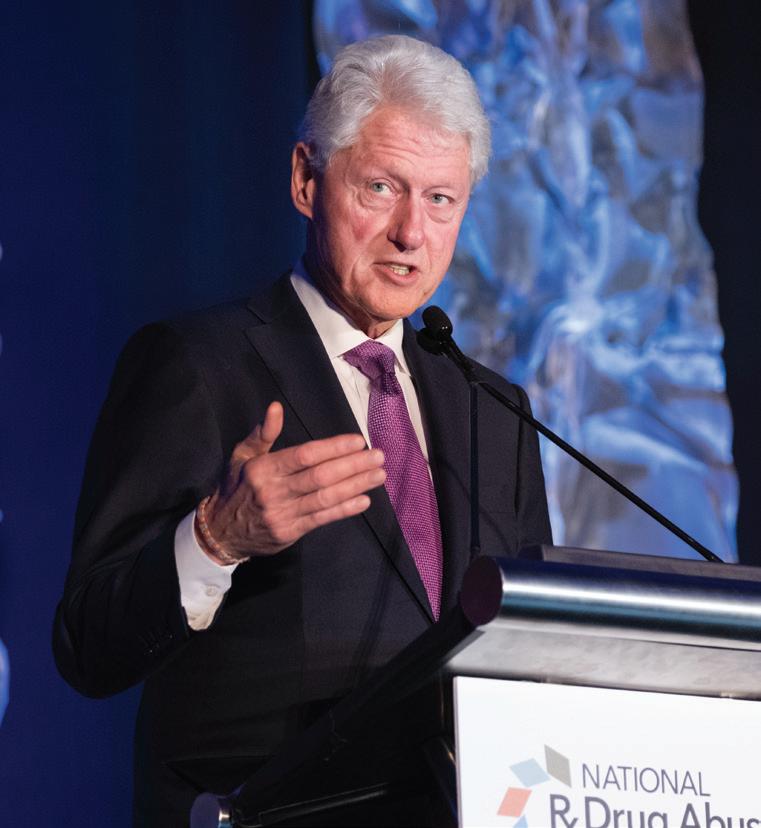
AUGUST 19-22, 2018 | DISNEYLAND, CA
Addiction professionals annually convene at NCAD to share what’s working: Clinicians hear from thought leaders on delivering treatment, while executives of behavioral healthcare organizations learn how to run more effective, more ef cient, and ethically minded businesses.
www.ncadcon.com

NOVEMBER 12-14, 2018 | FORT LAUDERDALE, FL
The opioid crisis is making headlines, but another category of drugs continues to devastate communities: stimulants. Join other stakeholders to explore how to address and treat stimulant use.
www.stimulantsummit.com
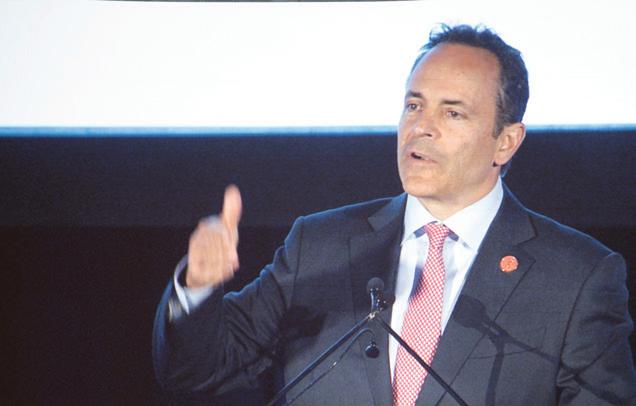

DECEMBER 10-12, 2018 | SCOTTSDALE, AZ
Senior executives of treatment centers, and those investing in these enterprises, discuss growth strategies and market dynamics at this exclusive, three-day educational and networking event.
www.treatmentcenterretreat.com
APRIL 30-MAY 2, 2018 | HILTON HEAD, SC
TCEM provides CEOs, CFOs, COOs, directors, senior marketing/business development/ admissions leaders, and other executives with the tools they need to effectively and ethically grow their services in a rapidly changing market.
www.executiveandmarketingretreat.com
Interested in attending an event? Contact Ellen Kelley at ekelley@iabhc.com or 216-373-1223.
Photography: Pete Winkel GPA and Chris Williams Zoeica Images
President Barack Obama addressed Institute attendees in 2016.
Matt Bevin, Governor of Kentucky, addressed Institute attendees in 2017.
CME and CE Hours CE Hours CE Hours
President Bill Clinton addressed attendees in 2018.
National-Regional Events
CE Hours
The Summits for Clinical Excellence bring together thought leaders on cutting-edge topics in multi-day national and regional conferences. Summits on mindfulness, trauma, process addiction, and shame appeal particularly to private practice behavioral healthcare professionals. Other Summits address the national opioid crisis from a regional perspective and engage a diverse group of stakeholders. Many Summits offer treatment ethics continuing education credits.
• PITTSBURGH, PA June 25-26, 2018
The Opioid Crisis: The Clinician’s Role and Treatment Practices
www.pittsburghopioidsummit.com
• ATLANTA, GA October 18-21, 2018
Brain Matters: Shame, Trauma, and Process Addictions www.atlantasummitconference.com
• NEW ENGLAND November 8-9, 2018
The Opioid Crisis: Strategies for Treatment and Recovery www.newenglandopioidsummit.com

• PHOENIX, AZ February 20-22, 2019
The Opioid Crisis: The Clinician’s Role and Treatment Practices www.arizonaopioidsummit.com
• CHICAGO, IL March 6-7, 2019
The Opioid Crisis: Strategies for Treatment and Recovery www.chicagoopioidsummit.com
• CHICAGO, IL March 6-9, 2019
The National Conference on Trauma, Addictions, and Mindfulness: Where Freud Meets Buddha www.chicagosummitconference.com
Local Events
The National Conference on Alcohol and Addiction Disorders convenes panel discussions across the country in a lunch & learn format. Clinicians hear about treatment practices, while those on the business side of the field share strategies for managing and marketing behavioral healthcare organizations. www.iabhc.com/local
Virtual Events
Interested in attending an event? Contact Ellen Kelley at ekelley@iabhc.com or 216-373-1223.
events: Baltimore Chicago Columbus, OH Denver Detroit King of Prussia, PA Long Island Memphis Nashville New Orleans Phoenix Pittsburgh Providence Salt Lake City San Diego Washington, DC
Upcoming
CE Hours
from experts on clinical, managerial, and other topics in our frequent, free-to-attend Webinars. www.iabhc.com/webinars
Hear
CE Hours
Unity Center for Behavioral Health
Portland, Oregon
BY JILL SEDERSTROM
he Unity Center for Behavioral Health in Portland, Oregon, aims to embody the concept of unity in more ways than one. Competitors have now become collaborators, the lines have blurred between public and private paying patients, and comfort is carefully balanced with safety in the new 110,000 square foot center that provides emergency psychiatric and inpatient services.
The 24-hour facility takes an innovative approach to behavioral and mental health by combining the psychiatric units and resources of four different health systems—Adventist Health, Legacy Health, Kaiser Permanente and Oregon Health and Science University—into one joint initiative to better meet the city’s needs.
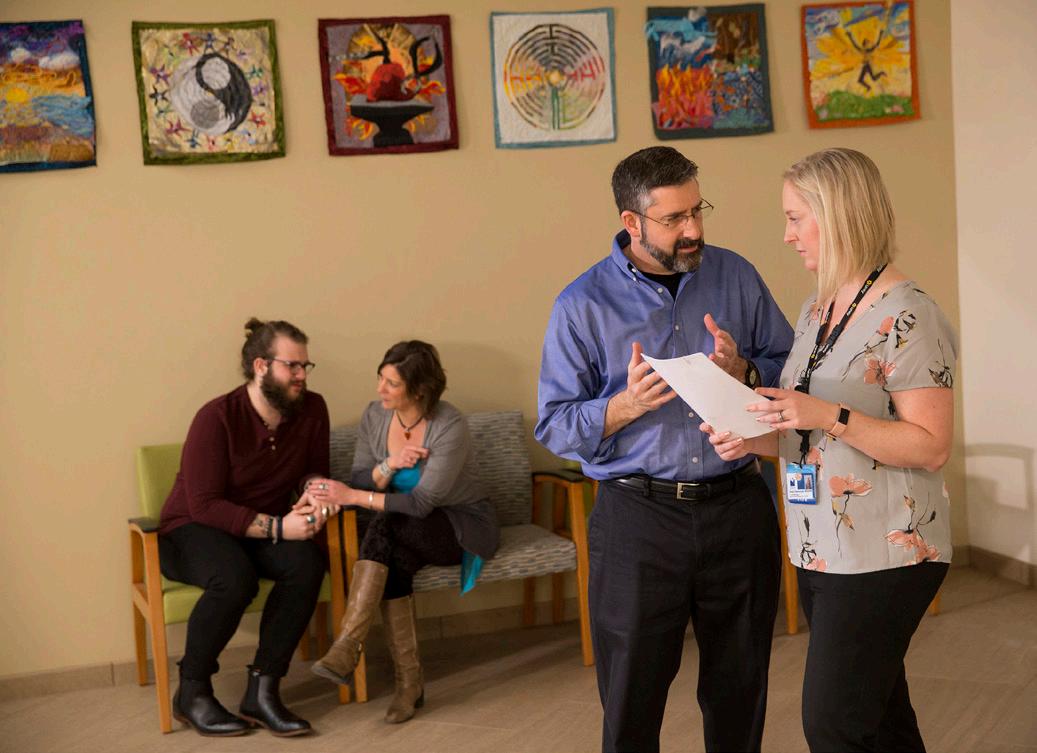
The building’s design, material choices and layout were methodically selected after feedback was gathered from large stakeholder meetings that brought together each health system, the center’s staff and patient advocates. The group focused on the concept of trauma-informed care.
“That’s really what drove our design,” says Chris Farentinos, MPH, vice president of Unity Center for Behavioral Health.
The end result is a large facility with two separate units: a emergency psychiatric services unit that typically serves about
32 people each day and can keep patients for up to 23 hours in outpatient observation status; and a 107-bed inpatient unit including 22 beds for children and adolescents.
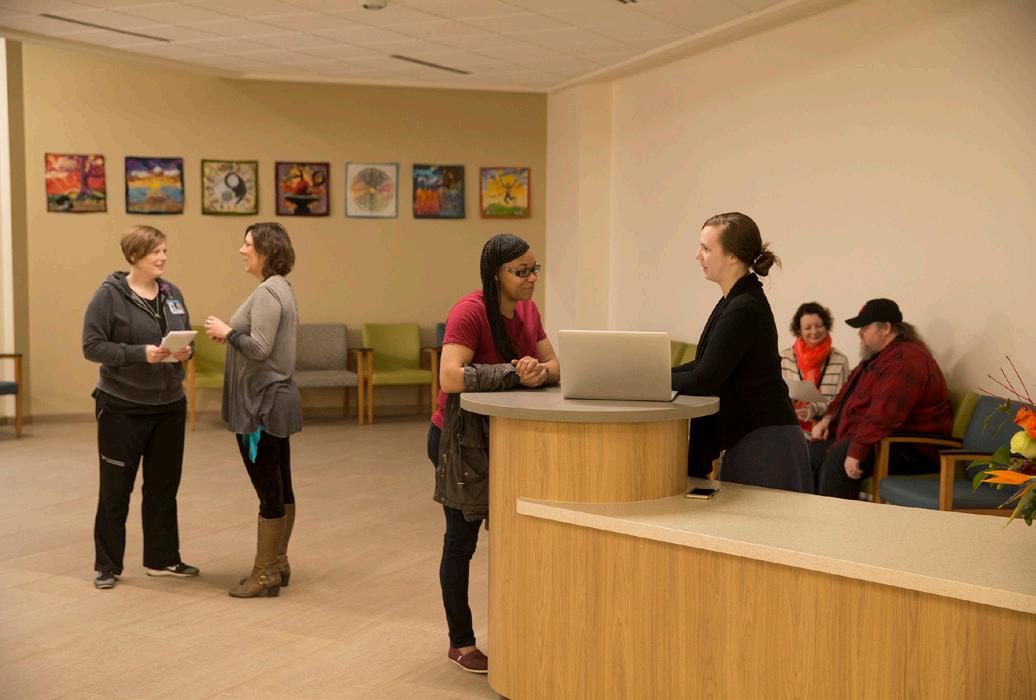

Farentinos describes the psychiatric emergency services area as an open therapeutic milieu lined with large windows that bring in natural light. The room is filled with comfortable recliners in bright colors, such as lime green and yellow, where patients can sit and relax. Interaction between staff and patients is encouraged by incorporating an open nurses station that makes the staff easily accessible without closed-off physical barriers. The area is also equipped with staff laptops so that nurses are able to bring the computers to the patient to do their charting more easily.
The open nurses station also offers a clear line of sight of the space for nurses and other staff. Behind the station is a glass,
DESIGN FOCUS 28 SPRING 2018 BEHAVIORAL HEALTHCARE EXECUTIVE WWW.BEHAVIORAL.NET
PHOTOS: JOHN VALLS
PHOTO: CORKY MILLER
charting station that serves as a secure location. Comfort was a key goal of the interior design, but designers carefully balanced their desire for patients to feel at ease with security.
“A lot of safety is about relationships. The more relational your nursing staff is with the patients, the safer the environment becomes,” Farentinos says.
INPATIENT FEATURES
The balance between comfort and safety was continued in the inpatient portion of the center. Farentinos says an important aspect of the design process was talking with patients who had stayed in inpatient centers about what features would make them feel more at ease in their rooms.

Using this feedback, the team created specially designed closets in each inpatient room that had cell phone charging stations and a secure area where patient belongings could be secured.
“Patients told us they wanted their cell phones, and they wanted their belongings close to them,” Farentinos says.
Google has finally introduced a certification process for rehab facilities to use the AdWords platform again. After a four-month-long ban on all rehab ads in the US, Google’s new certification process comes as welcome news.

DESIGN FOCUS
WANT TO LEARN MORE? CONTACT US TODAY: (888) 307-7304 GOOGLE ADWORDS IS BACK AND WE ARE STILL A GOOGLE PREMIER PARTNER AND AN INDUSTRY LEADER IN PPC/SEO.
PHOTO: LEGACY HEALTH
Another desired item was a clock, so Unity Center mounted digital clocks inside the closet that could be seen from the outside. They added color to each room by incorporating an accent wall and vinyl prints of landscapes.
“We have a bench by the window in all of the rooms, which allow for visitors to sit down and visit,” Farentinos says.






















All behavioral health providers need to address ligature issues and consider the degree of risk related to the population served. At Unity Center, slanted bathroom doors were cut to an angle so the top of the door does not allow for ligature points, adding an extra level of safety in the rooms.

















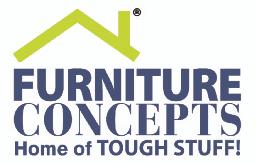
Each aspect of the building’s design was carefully considered, but the work doesn’t end there. Unity Center for Behavioral Health also has plans for an elaborate garden outside, complete with two walking paths, exercise bikes equipped for the outdoor elements and a basketball hoop. The garden is expected to open this summer.

DESIGN FOCUS 30 SPRING 2018 BEHAVIORAL HEALTHCARE EXECUTIVE WWW.BEHAVIORAL.NET 800. 969. 4100 www.furnitureconcepts.com info@furnitureconcepts.com FURNITURE CONCEPTS DURABLE Secure Furniture Wood, Metal & Molded Plastic Bedsrooms. Mattresses, Dining, Seating and More. ® ® n f o Me al Beds & Casegoods Ma resses L ob bies & C ommon Rooms Solid Wood Furni ure Comple e Bedrooms An i-Con raband Dependable Uphols ered Sea ing Dining Super Rugged Beds Bedbug Solu ions! Affordabe Furn iure Furni ure for Secure Environmen s S ylish & Func ional Incon inence-Fluid Solu ions Limi ed Mobili y Furniture_Concepts_Behavioral_Health_Ad.qxp_Furniture_Concepts_Ad 4/25/18 5:05 PM Page 1
Jill Sederstrom is a freelance writer based in Kansas.
PHOTO: JOHN VALLS
ANALYTICS
HEALTH INFORMATION EXCHANGE CONNECTIVITY
Netsmart
Overland Park, KS
Contact: Stephanie Gunter (913) 242-6050
sgunter@ntst.com
www.ntst.com/techguide
CONSUMER WEB PORTAL
CrisisTech360, LLC
Atlanta, GA
Contact: Gina Gibson (404) 419-7595
info@crisistech360.com

www.crisistech360.com
CrisisTech 360’s suite of products is web/ mobile-enabled and fully customizable for realtime views of BH/IDD crisis program activity 24/7/365. Whether tracking facility referral and utilization or mobile crisis response services, CrisisTech 360 has a solution for you. Real-time dashboards, data share for EHR integration and reporting capabilities provide tomorrow’s KPI tracking today. CrisisTech 360 is a wholly owned subsidiary of Behavioral Health Link (BHL).
Qualifacts Systems, Inc.
Nashville, TN (866) 386-6755
info@qualifacts.com
www.qualifacts.com
Qualifacts® is one of the most trusted technology providers of Electronic Health Records (EHR) for behavioral health and human services organizations. Our EHR platform, CareLogic, is designed to help behavioral health and human services agencies achieve better client outcomes by simplifying the complexity of workflows enterprise-wide. As a strategic partner, Qualifacts helps clinicians stay focused on what matters most – client care. With a comprehensive suite of clinical tools and decision support resources, your organization can connect strategically, operate efficiently and make data driven decisions. To learn more, visit www.qualifacts.com.
MEANINGFUL USE
Netsmart
Overland Park, KS
Contact: Stephanie Gunter (913) 242-6050
sgunter@ntst.com
www.ntst.com/techguide
E-LEARNING/ONLINE EDUCATION
Netsmart
Overland Park, KS
Contact: Stephanie Gunter (913) 242-6050
sgunter@ntst.com
www.ntst.com/techguide
Netsmart
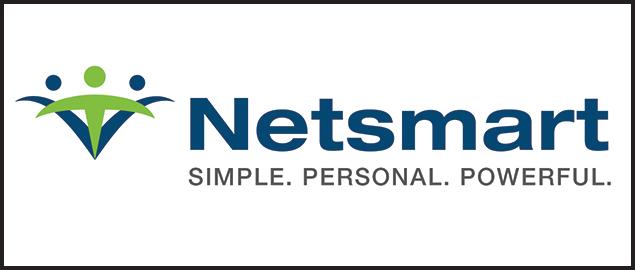



Overland Park, KS
Contact: Stephanie Gunter (913) 242-6050
sgunter@ntst.com
REAL Prevention
Placentia, CA
Contact: Michelle Miller-Day (844) 255-7325
michelle@real-prevention.com
www.real-prevention.com
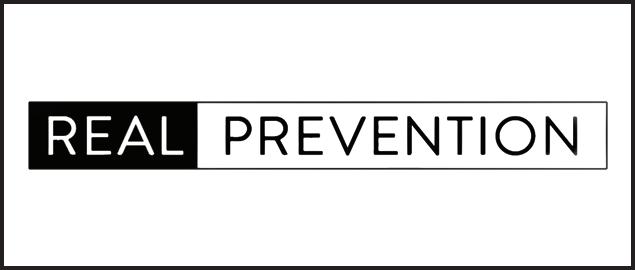
REAL Prevention is a leading developer of substance abuse prevention programs. We offer nationally rated, evidence-based, effective programs for youth. Our programs were recently noted by the U.S. Surgeon General as particularly effective. REAL Media and kiR High School are fully online e-learning modules that make program delivery convenient and fun. Youth develop social and emotional competencies along with information and strategies that enable them to make competent decisions around alcohol, tobacco, and other drugs.
Netsmart knows integration is imperative to your organization which is why we are a founding partner of the Carequality Interoperability Framework. This is an initiative designed to advance progress in health data exchange among multi-platform networks, healthcare providers, electronic health record (EHR) and health information exchange (HIE) vendors. Carequality isn’t a new, separate data sharing network for you to join. Instead, Carequality builds on data exchange relationships and agreements already in place and expands their reach. By enabling seamless connectivity across all participating networks, Netsmart clients can leverage data to deliver the right care to the right person, at the right time.
www.ntst.com/techguide
Qualifacts Systems, Inc.
Nashville, TN (866) 386-6755
info@qualifacts.com
www.qualifacts.com
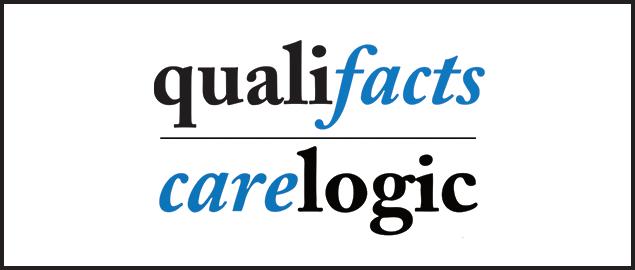
Qualifacts® is one of the most trusted technology providers of Electronic Health Records (EHR) for behavioral health and human services organizations. Our EHR platform, CareLogic, is designed to help behavioral health and human services agencies achieve better client outcomes by simplifying the complexity of workflows enterprise-wide. As a strategic partner, Qualifacts helps clinicians stay focused on what matters most – client care. With a comprehensive suite of clinical tools and decision support resources, your organization can connect strategically, operate

TECHNOLOGY GUIDE WWW.BEHAVIORAL.NET 31
efficiently and make data driven decisions. To learn more, visit www.qualifacts.com.
MOBILE HEALTH-mHEALTH
Qualifacts Systems, Inc.
Nashville, TN (866) 386-6755
info@qualifacts.com
www.qualifacts.com

Lua HIPAA Compliant Messaging and Telehealth
New York, NY
Contact: Michael DeFranco (646) 434-2646
hello@getlua.com www.getlua.com

Qualifacts® is one of the most trusted technology providers of Electronic Health Records (EHR) for behavioral health and human services organizations. Our EHR platform, CareLogic, is designed to help behavioral health and human services agencies achieve better client outcomes by simplifying the complexity of workflows enterprise-wide. As a strategic partner, Qualifacts helps clinicians stay focused on what matters most – client care. With a comprehensive suite of clinical tools and decision support resources, your organization can connect strategically, operate efficiently and make data driven decisions. To learn more, visit www.qualifacts.com.
SOFTWARE, ADMINISTRATIVE
SOFTWARE, BILLING
AdvantEdge Healthcare Solutions

Warren, NJ
Contact: Michael Krivich (877) 501-1611
info@ahsrcm.com
www.ahsrcm.com
AdvantEdge is a technology-enabled provider of behavioral health revenue cycle and business management solutions that substantially improve decision making, maximize financial performance, streamline operations and eliminate compliance risks. Our proven solutions include:
• Billing services
• Billing, scheduling and front-end software
• Revenue optimization
• Informatics
• Practice management
Each of our services is tailored to meet each customer’s specific business needs. Contact us at www.ahsrcm.com, info@ahsrcm.com or (877) 501-1611.
myStrength, Inc.

Denver, CO
Contact: Chuck Tepper (484) 380-2633
info@mystrength.com
www.mystrength.com
myStrength’s digital behavioral health platform greatly enhances traditional care models while addressing issues of cost, lack of access, and stigma, to deliver mental health and well-being resources at scale. myStrength targets the most prevalent and costly behavioral health conditions, empowering consumers with innovative self-care resources to manage and overcome challenges with depression, anxiety, SUDs, chronic pain and insomnia. myStrength partners with over 150 health plans, community behavioral health providers, integrated health systems and ACOs.
Both Worlds Software, Inc.
Jupiter, FL
Contact: Jo-Anne Satterly (877) 268-4967
sales@bothworldssoftware.com
www.compliancemanagersoftware.com
Both Worlds Software’s Compliance Manager is a DUI Software program built specifically for DUI and DDP administration to centralize management of client demographic information, required education courses, group sessions and individual appointments. All related financials, letters and state reporting statistics are available at a button press!
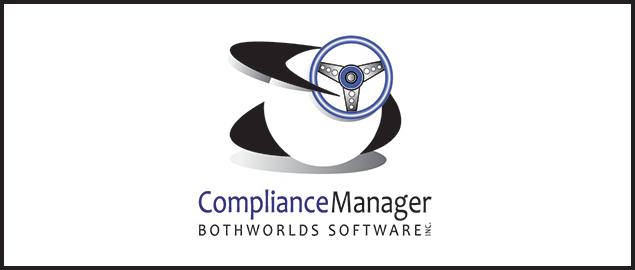
EMR-Bear, LLC
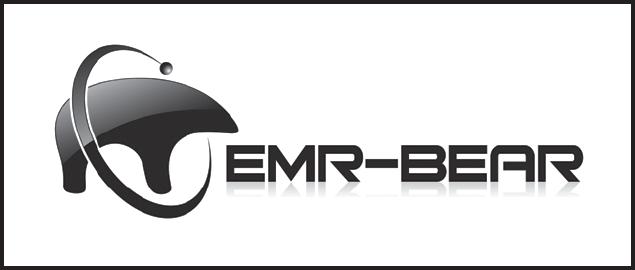
Sante Fe, NM
Contact: Jay Heneghan (877) 875-2327
info@emrbear.com
www.emrbear.com
Cloud-based, ONC-certified electronic health record, billing, and practice management service designed specifically by and for behavioral health organizations. Documentation timeliness triggers, group therapy dashboard, medication management, DSM decision trees, unlimited customizable clinical forms, complete revenuemanagement suite, and meaningful use reporting tools included. E-prescriptions, e-faxing, integrated tele-health unit, and automated appointment reminder system also available. Designed to not only uphold and support your standards of care, but to help elevate them. “Go better than paperless.”
Netsmart

Overland Park, KS
Contact: Stephanie Gunter (913) 242-6050
sgunter@ntst.com
www.ntst.com/techguide
TECHNOLOGY GUIDE 32 SPRING 2018 BEHAVIORAL HEALTHCARE EXECUTIVE WWW.BEHAVIORAL.NET
HCS
Wall Township, NJ
Contact: Joe Bonelli (800) 524-1038
marketing@hcssupport.com
www.hcsinteractant.com
HCS is a leading provider of an all-in-one healthcare technology platform that spans electronic health records (EHR), revenue cycle management, financial management, mobility, and business intelligence. In use at over 5,000 LTACH, behavioral health, and senior living facilities, the Interactant® platform helps multi-site providers deliver better quality and safety in care while increasing efficiencies and financial performance.
Qualifacts Systems, Inc.
Nashville, TN (866) 386-6755
info@qualifacts.com
www.qualifacts.com

Qualifacts® is one of the most trusted technology providers of Electronic Health Records (EHR) for behavioral health and human services organizations. Our EHR platform, CareLogic, is designed to help behavioral health and human services agencies achieve better client outcomes by simplifying the complexity of workflows enterprise-wide. As a strategic partner, Qualifacts helps clinicians stay focused on what matters most – client care. With a comprehensive suite of clinical tools and decision support resources, your organization can connect strategically, operate efficiently and make data driven decisions. To learn more, visit www.qualifacts.com.
SOFTWARE, CARE MANAGEMENT
Netsmart
Overland Park, KS
Contact: Stephanie Gunter (913) 242-6050
sgunter@ntst.com
www.ntst.com/techguide
Streamline Healthcare Solutions
Kalamazoo, MI
Contact: Cristina Prince (877) 467-4741
info@streamlinehealthcare.com www.streamlinehealthcare.com
SOFTWARE, CLINICAL
MICA Information Systems

Winston-Salem, NC
Contact: Bob Ring (800) 344-6422
bring@medical.com
www.medical.com
MICA Billing Services offers complete Revenue Cycle Management solutions for Behavioral Health Practices. Our IMS software is a powerful Practice Management tool with robust reporting capabilities, both canned and customizable. We have been in business since 1979 and our knowledgeable and experienced billing staff consistently exceeds industry averages for days in receivables and claim resolution.
Foothold Technology
New York, NY
Contact: Nick Scharlatt (212) 780-1450 info@footholdtechnology.com www.footholdtechnology.com
Foothold Technology
New York, NY
Contact: Nick Scharlatt (212) 780-1450
info@footholdtechnology.com
www.footholdtechnology.com


HCS
Wall Township, NJ
Contact: Joe Bonelli (800) 524-1038
InfoMC Inc.
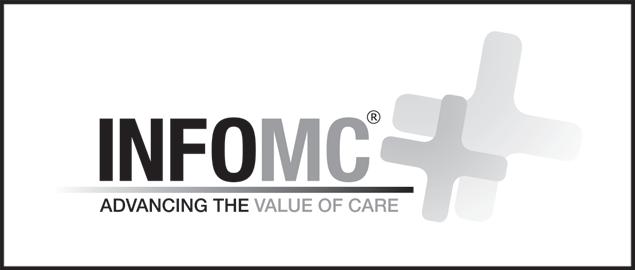
marketing@hcssupport.com www.hcsinteractant.com
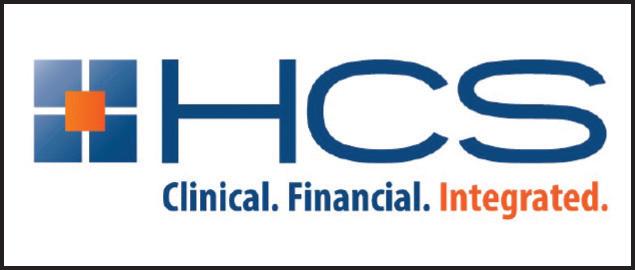

Netsmart


Overland Park, KS
Contact: Stephanie Gunter (913) 242-6050
sgunter@ntst.com
www.ntst.com/techguide
Netsmart Revenue Cycle Management (RCM) is a comprehensive billing service that helps reduce costs, optimize workflow and improve the bottom line. The Netsmart RCM team understands the complexities of revenue cycle processes and can help you implement best practices to improve cash flow and enhance profitability. In 2016, for every $1 spent on RCM, we improved clients’ cash by an additional $16.
Conshohocken, PA
Contact: JJ Farook (484) 530-0100 sales@infomc.com www.infomc.com
HCS is a leading provider of an all-in-one healthcare technology platform that spans electronic health records (EHR), revenue cycle management, financial management, mobility, and business intelligence. In use at over 5,000 LTACH, behavioral health, and senior living facilities, the Interactant® platform helps multi-site providers deliver better quality and safety in care while increasing efficiencies and financial performance.
TECHNOLOGY GUIDE WWW.BEHAVIORAL.NET 33
SOFTWARE, ELECTRONIC HEALTH RECORDS
Netsmart

Overland Park, KS
Contact: Stephanie Gunter (913) 242-6050
sgunter@ntst.com
www.ntst.com/techguide
Providers across the care continuum are tasked with being able to produce improved clinical outcomes while reducing cost and increasing patient satisfaction. By leveraging the powerful Netsmart network, care providers can seamlessly and securely integrate information across communities, collaborate on the most effective treatments and improve outcomes for those in their care. Our streamlined systems and personalized workflows put relevant information at the fingertips of users when and where they need it.
Angel Systems, Inc.

Riverview, FL
Contact: Sandra D'Angelo (888) 470-3545
info@angelsystemsinc.com www.angelsystemsinc.com
AVENUES is a comprehensive, dynamic electronic medical record for the Behavioral Health Care Industry, accommodating inpatient, residential, partial, substance abuse, outpatient, community services, developmentally disabled and special education organization needs. Modules Include: Referral & Marketing, Complete EHR, Treatment Planning, Medication Management (incl. eMAR and ePrescribing), Resource Management, Scheduling, Outcomes Measurement, School Management, IEP and Gradebook, Incident Management, Billing and Accounts Receivable.
Qualifacts Systems, Inc.
Nashville, TN
(866) 386-6755
info@qualifacts.com
www.qualifacts.com

Qualifacts® is one of the most trusted technology providers of Electronic Health Records (EHR) for behavioral health and human services organizations. Our EHR platform, CareLogic, is designed to help behavioral health and human services agencies achieve better client outcomes by simplifying the complexity of workflows enterprise-wide. As a strategic partner, Qualifacts helps clinicians stay focused on what matters most – client care. With a comprehensive suite of clinical tools and decision support resources, your organization can connect strategically, operate efficiently and make data driven decisions. To learn more, visit www.qualifacts.com.
SOFTWARE, EAPS
InfoMC Inc.

Conshohocken, PA
Contact: JJ Farook (484) 530-0100
sales@infomc.com
www.infomc.com
BestNotes
Twin Falls, ID
Contact: Jon Winther (208) 534-6646
sales@bestnotes.com www.bestnotes.com
Compulink Business Systems
Thousand Oaks, CA
Contact: Sondra Carrube (800) 456-4522
sales@compulinkadvantage.com www.compulinkadvantage.com
Core Solutions, Inc.

King of Prussia, PA
Contact: Mike Waldron (610) 687-6080
marketing@corelsutionsinc.com
www.coresolutionsinc.com
Core Solutions is the progressive leader in transforming the health and human services experience for behavioral health providers, consumers and state and county agencies. Core’s 2nd Generation integrated, configurable EHR software, Cx360, offers advanced information management functionality to achieve improved outcomes and relationships between providers, consumers, and payers. Cx360’s consumercentric, interface simplifies the end-to-end HHS experience, delivers integrated care coordination, improves consumer engagement and centralizes reimbursement processes.
Credible Behavioral Health, Inc.
Rockville, MD
Contact: Jaclyn O’Donnell (301) 652-9500
partnership@credibleinc.com www.credibleinc.com
Starting 2018 as both the Behavioral Health EHR with the most meaningful use stage 3 certifications and a fully functioning multi-platform connected or disconnected mobile solution. Credible is committed to improving the quality of care and lives in behavioral health for clients, families, providers, and management. Since founded in June 2000, Credible has Partnered with over 375 Partner Agencies in 34 states. Credible is proud to provide secure, proven, easy to use software for clinic, community, residential, and mobile care providers leveraging a true Partnership approach.

TECHNOLOGY GUIDE 34 SPRING 2018 BEHAVIORAL HEALTHCARE EXECUTIVE WWW.BEHAVIORAL.NET
EMR-Bear, LLC

Sante Fe, NM
Contact: Jay Heneghan (877) 875-2327
info@emrbear.com
www.emrbear.com
Cloud-based, ONC-certified electronic health record, billing, and practice management service designed specifically by and for behavioral health organizations. Documentation timeliness triggers, group therapy dashboard, medication management, DSM decision trees, unlimited customizable clinical forms, complete revenuemanagement suite, and meaningful use reporting tools included. E-prescriptions, e-faxing, integrated tele-health unit, and automated appointment reminder system also available. Designed to not only uphold and support your standards of care, but to help elevate them. “Go better than paperless.”
MICA Information Systems

Winston-Salem, NC
Contact: Bob Ring (800) 344-6422 bring@medical.com www.medical.com
MICA Information Systems is the #1 ValueAdded Re-seller in the U.S. for Intelligent Medical Software (IMS) by Meditab. IMS is a fully-certified, integrated Practice Management/EHR Suite, with Patient Portal, Mobile App, and Televisit functionality. Our premium IMS software and outstanding customer support make us the perfect solution for larger Behavioral Health practices. IMS is MACRA/MIPS compliant and meets the new CMS reporting requirements for therapists beginning in 2019.
Qualifacts Systems, Inc.
Nashville, TN (866) 386-6755
info@qualifacts.com
www.qualifacts.com

Qualifacts® is one of the most trusted technology providers of Electronic Health Records (EHR) for behavioral health and human services organizations. Our EHR platform, CareLogic, is designed to help behavioral health and human services agencies achieve better client outcomes by simplifying the complexity of workflows enterprise-wide. As a strategic partner, Qualifacts helps clinicians stay focused on what matters most – client care. With a comprehensive suite of clinical tools and decision support resources, your organization can connect strategically, operate efficiently and make data driven decisions. To learn more, visit www.qualifacts.com.
Foothold Technology
New York, NY
Contact: Nick Scharlatt (212) 780-1450 info@footholdtechnology.com www.footholdtechnology.com

Netsmart

Overland Park, KS
Contact: Stephanie Gunter (913) 242-6050
sgunter@ntst.com
www.ntst.com/techguide
Netsmart innovates electronic health records (EHRs), solutions and services that are powerful, intuitive and easy-to-use. Our platform provides accurate, up-to-date information which is easily accessible to care team members in behavioral health, care at home, senior living and social services. We make the complex simple and personalized so our clients can concentrate on what they do best: provide much needed services and treatment that support whole-person care.
HCS
Wall Township, NJ
Contact: Joe Bonelli (800) 524-1038 marketing@hcssupport.com www.hcsinteractant.com

HCS is a leading provider of an all-in-one healthcare technology platform that spans electronic health records (EHR), revenue cycle management, financial management, mobility, and business intelligence. In use at over 5,000 LTACH, behavioral health, and senior living facilities, the Interactant® platform helps multi-site providers deliver better quality and safety in care while increasing efficiencies and financial performance.
ProComp Software Consultants, Inc.
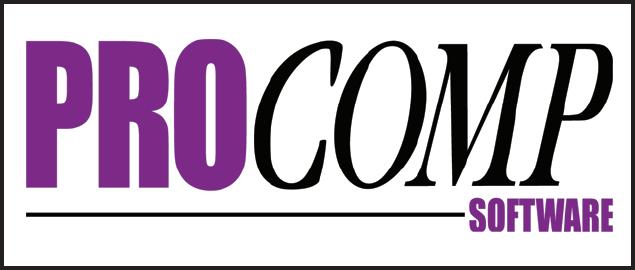
Cincinnati, OH
Contact: Cheri Rodman (800) 783-1668
catt@procompsoftware.com www.procompsoftware.com
Remarkable Health
Scottsdale, AZ
Contact: Alyson Larimer (480) 550-8077
sales@remarkablehealth.com
www.remarkablehealth.com
Remarkable Health is the leading Provider Success Software Company focused on the behavioral health, substance abuse, and human services industries. For more than 25 years, we have passionately focused on delivering the tools that organizations in these industries need to provide remarkable client experiences. Our CT|One platform is a purpose-built, integrated Electronic Health Record (EHR)—Clinical, Billing, Scheduling, Medication Management, and Reporting—for inpatient, outpatient, and residential facilities. Contact us today to learn more!
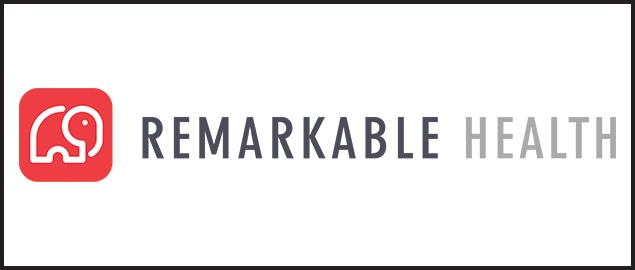
TECHNOLOGY GUIDE WWW.BEHAVIORAL.NET 35
Sigmund Software
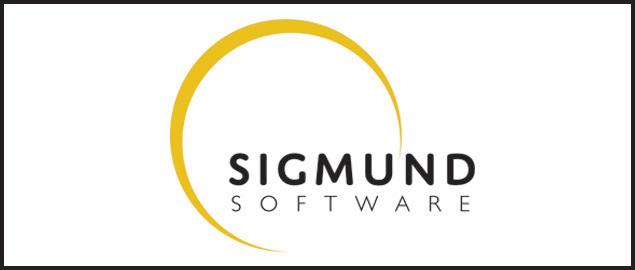
Danbury, CT
Contact: Cory Valentine (800) 448-6975
information@sigmundsoftware.com
www.sigmundsoftware.com
Sigmund Aura is the next generation of electronic medical records. Designed to work the way providers in behavioral health and addiction treatment do, Aura is built to be fast, inclusive, intuitive, and flexible. And most important: mobile. At your desk or on the floor, Aura enables you to get real-time updates, set rules-based alerts, coordinate care among all team members, design treatment plans in just minutes, and access records, patient history, and medications.
TenEleven Group

East Amherst, NY (716) 810-9755
ecr@10e11.com
www.10e11.com
TenEleven Group is a software and services company that provides solutions for behavioral health agencies to manage their end to end business process from intake to outcomes. Our commitment to our customer is to provide the guidance and technology support necessary to thrive in a performance based payment system. Thousands of users in hundreds of offices use electronic Clinical Record (eCR™) to manage their practice. Learn more about TenEleven at www.10e11.com.
SOFTWARE, ENTERPRISE
Streamline Healthcare Solutions
Kalamazoo, MI
Contact: Cristina Prince (877) 467-4741
info@streamlinehealthcare.com
www.streamlinehealthcare.com

Streamline Healthcare Solutions (Streamline) delivers web-based software for healthcare organizations to provide and coordinate specialized behavioral service delivery processes. Streamline’s SmartCare™ solution was developed to truly integrate all departments, moving them to a more holistic service model. Streamline’s software solutions are well suited for organizations who wish to have a system that can incorporate its entire business processes into a single solution, with the ability to continue to grow as businesslines needs evolve.
Foothold Technology
New York, NY
Contact: Nick Scharlatt (212) 780-1450
info@footholdtechnology.com
www.footholdtechnology.com

Qualifacts Systems, Inc.
Nashville, TN (866) 386-6755
info@qualifacts.com
www.qualifacts.com

Qualifacts® is one of the most trusted technology providers of Electronic Health Records (EHR) for behavioral health and human services organizations. Our EHR platform, CareLogic, is designed to help behavioral health and human services agencies achieve better client outcomes by simplifying the complexity of workflows enterprise-wide. As a strategic partner, Qualifacts helps clinicians stay focused on what matters most – client care. With a comprehensive suite of clinical tools and decision support resources, your organization can connect strategically, operate efficiently and make data driven decisions. To learn more, visit www.qualifacts.com.
SOFTWARE, FINANCIAL
Netsmart
Overland Park, KS
Contact: Stephanie Gunter (913) 242-6050
sgunter@ntst.com
www.ntst.com/techguide
HCS
Wall Township, NJ
Contact: Joe Bonelli (800) 524-1038
marketing@hcssupport.com

www.hcsinteractant.com
HCS is a leading provider of an all-in-one healthcare technology platform that spans electronic health records (EHR), revenue cycle management, financial management, mobility, and business intelligence. In use at over 5,000 LTACH, behavioral health, and senior living facilities, the Interactant® platform helps multi-site providers deliver better quality and safety in care while increasing efficiencies and financial performance.
Netsmart


Overland Park, KS
Contact: Stephanie Gunter (913) 242-6050
sgunter@ntst.com
www.ntst.com/techguide
TECHNOLOGY GUIDE 36 SPRING 2018 BEHAVIORAL HEALTHCARE EXECUTIVE WWW.BEHAVIORAL.NET
SOFTWARE, MANAGED CARE/ PAYER
InfoMC Inc.

Conshohocken, PA
Contact: JJ Farook (484) 530-0100
sales@infomc.com
www.infomc.com
SOFTWARE, OUTCOMES
BestNotes
Twin Falls, ID
Contact: Jon Winther (208) 534-6646
sales@bestnotes.com
www.bestnotes.com
CrisisTech360, LLC
Atlanta, GA
Contact: Gina Gibson (404) 419-7595
info@crisistech360.com

www.crisistech360.com
CrisisTech 360’s suite of products is web/ mobile-enabled and fully customizable for realtime views of BH/IDD crisis program activity 24/7/365. Whether tracking facility referral and utilization or mobile crisis response services, CrisisTech 360 has a solution for you. Real-time dashboards, data share for EHR integration and reporting capabilities provide tomorrow’s KPI tracking today. CrisisTech 360 is a wholly owned subsidiary of Behavioral Health Link (BHL).
Qualifacts Systems, Inc.
Nashville, TN
(866) 386-6755
info@qualifacts.com
www.qualifacts.com

Qualifacts® is one of the most trusted technology providers of Electronic Health Records (EHR) for behavioral health and human services organizations. Our EHR platform, CareLogic, is designed to help behavioral health and human services agencies achieve better client outcomes by simplifying the complexity of workflows enterprise-wide. As a strategic partner, Qualifacts helps clinicians stay focused on what matters most – client care. With a comprehensive suite of clinical tools and decision support resources, your organization can connect strategically, operate efficiently and make data driven decisions. To learn more, visit www.qualifacts.com.
Foothold Technology
New York, NY
Contact: Nick Scharlatt (212) 780-1450
info@footholdtechnology.com
www.footholdtechnology.com

Community Data Roundtable

Pittsburgh, PA
Contact: Dan Warner (570) 258-5915
dwarner@communitydataroundtable.org www.communitydataroundtable.org
CDR is a boutique data analytics and consulting firm that focuses on improving outcomes in the behavioral health and child welfare systems. With our proprietary CANS/ANSA/FAST software (the DataPool™) and advanced analytic and implementation science, we work with purchasers, payers, and providers to optimize patient care. Our mission-driven team works together to gather and analyze data to produce clear, concise reports to help inform state and county decision-makers, managed care, providers and quality improvement efforts.
*Option to plug-in to existing EMRs in order to visualize data is also available.
Netsmart

Overland Park, KS
Contact: Stephanie Gunter (913) 242-6050
sgunter@ntst.com
www.ntst.com/techguide
Providers across the care continuum are tasked with being able to produce improved clinical outcomes while reducing cost and increasing patient satisfaction. By leveraging the powerful Netsmart network, care providers can seamlessly and securely integrate information across communities, collaborate on the most effective treatments and improve outcomes for those in their care. Our streamlined systems and personalized workflows put relevant information at the fingertips of users when and where they need it.
Remarkable Health
Scottsdale, AZ
Contact: Alyson Larimer (480) 550-8077
sales@remarkablehealth.com www.remarkablehealth.com
Remarkable Health is the leading Provider Success Software Company focused on the behavioral health, substance abuse, and human services industries. For more than 25 years, we have passionately focused on delivering the tools that organizations in these industries need to provide remarkable client experiences. Our CT|One platform is a purpose-built, integrated Electronic Health Record (EHR)—Clinical, Billing, Scheduling, Medication Management, and Reporting—for inpatient, outpatient, and residential facilities. Contact us today to learn more!

TECHNOLOGY GUIDE WWW.BEHAVIORAL.NET 37
SOFTWARE, PHARMACY
Netsmart
Overland Park, KS
Contact: Stephanie Gunter (913) 242-6050 sgunter@ntst.com www.ntst.com/techguide
SOFTWARE, PRIVATE/SMALL PRACTICE
OnShift
Cleveland, OH
Contact: Ken Roos (216) 333-1353 info@onshift.com www.onshift.com
OnShift delivers cloud-based human capital management software and proactive services to solve everyday workforce challenges in healthcare. Our suite of products for hiring, scheduling and employee engagement drives quality care, lower costs and higher performance by empowering providers to staff consistently and efficiently. Intuitive design, predictive analytics and customer success management are why thousands of organizations rely on OnShift.

SOFTWARE, WEB-BASED
Netsmart
Overland Park, KS
Contact: Stephanie Gunter (913) 242-6050
sgunter@ntst.com
www.ntst.com/techguide
Paradigm Technology Consulting

Allentown, NJ
Contact: Michael Gummel (866) 782-4636
sales@ptcllc.com
www.ptcllc.com
Netsmart



Overland Park, KS
Contact: Stephanie Gunter (913) 242-6050 sgunter@ntst.com www.ntst.com/techguide
SOFTWARE, STAFF SCHEDULING
Credible Behavioral Health, Inc.
Rockville, MD
Contact: Jaclyn O’Donnell (301) 652-9500
partnership@credibleinc.com
www.credibleinc.com

Both Worlds Software, Inc.
Jupiter, FL
Contact: Jo-Anne Satterly (877) 268-4967 sales@bothworldssoftware.com www.compliancemanagersoftware.com
Both Worlds Software’s Compliance Manager is a DUI Software program built specifically for DUI and DDP administration to centralize management of client demographic information, required education courses, group sessions and individual appointments. All related financials, letters and state reporting statistics are available at a button press!

Starting 2018 as both the Behavioral Health EHR with the most meaningful use stage 3 certifications and a fully functioning multi-platform connected or disconnected mobile solution. Credible is committed to improving the quality of care and lives in behavioral health for clients, families, providers, and management. Since founded in June 2000, Credible has Partnered with over 375 Partner Agencies in 34 states. Credible is proud to provide secure, proven, easy to use software for clinic, community, residential, and mobile care providers leveraging a true Partnership approach.
Paradigm’s Personal Allowance Manager (PAM) solution is a cloud-based subscription service for Representative Payees that fulfills your organization’s needs when it comes to both regulatory and accounting requirements. By improving controls in these key areas, PAM aids in satisfying regulatory requirements, for audit readiness. Featuring minimal upfront investment in both software/hardware, PAM offers your facility a solution that is budget-friendly.
Foothold Technology
New York, NY
Contact: Nick Scharlatt (212) 780-1450
info@footholdtechnology.com www.footholdtechnology.com

Qualifacts Systems, Inc.
Nashville, TN (866) 386-6755
info@qualifacts.com
www.qualifacts.com
Qualifacts® is one of the most trusted technology providers of Electronic Health Records (EHR) for behavioral health and human services organizations. Our EHR platform, CareLogic, is designed to help behavioral health and human services agencies achieve better client outcomes by simplifying the complexity of workflows enterprise-wide. As a strategic partner, Qualifacts helps clinicians stay focused on what matters most – client care. With a comprehensive suite of clinical tools and decision support resources, your organization can connect strategically, operate efficiently and make data driven decisions. To learn more, visit www.qualifacts.com.

TECHNOLOGY GUIDE 38 SPRING 2018 BEHAVIORAL HEALTHCARE EXECUTIVE WWW.BEHAVIORAL.NET
SOFTWARE, WIRELESS
Credible Behavioral Health, Inc.
Rockville, MD
Contact: Jaclyn O’Donnell (301) 652-9500
partnership@credibleinc.com
www.credibleinc.com

Starting 2018 as both the Behavioral Health EHR with the most meaningful use stage 3 certifications and a fully functioning multi-platform connected or disconnected mobile solution. Credible is committed to improving the quality of care and lives in behavioral health for clients, families, providers, and management. Since founded in June 2000, Credible has Partnered with over 375 Partner Agencies in 34 states. Credible is proud to provide secure, proven, easy to use software for clinic, community, residential, and mobile care providers leveraging a true Partnership approach.
TELEHEALTH/TELEPSYCHIATRY SYSTEMS EMR-Bear, LLC
Sante Fe, NM
Contact: Jay Heneghan (877) 875-2327
info@emrbear.com

www.emrbear.com
Cloud-based, ONC-certified electronic health record, billing, and practice management service designed specifically by and for behavioral health organizations. Documentation timeliness triggers, group therapy dashboard, medication management, DSM decision trees, unlimited customizable clinical forms, complete revenuemanagement suite, and meaningful use reporting tools included. E-prescriptions, e-faxing, integrated tele-health unit, and automated appointment reminder system also available. Designed to not only uphold and support your standards of care, but to help elevate them. “Go better than paperless.”
Netsmart

Overland Park, KS
Contact: Stephanie Gunter (913) 242-6050
sgunter@ntst.com
www.ntst.com/techguide
The Netsmart Telehealth platform enables a virtual healthcare community network of more than 200 million consumers, 600,000 providers and over 25,000 organizations combined. It helps connects clinicians with clients to provide remote services that are fully integrated into workflows. Using live, mobile technology is a cost–effective way to reach new clients and/or support your clients in their preferred care setting. Eliminate the walls of treatment and improve outcomes and client satisfaction with our Telehealth platform.
Qualifacts Systems, Inc.
Nashville, TN
(866) 386-6755
info@qualifacts.com
www.qualifacts.com

Qualifacts® is one of the most trusted technology providers of Electronic Health Records (EHR) for behavioral health and human services organizations. Our EHR technology and services simplify the increasing complexities facing providers, enabling them to quickly adapt to the accelerating pace of change. As a strategic partner, Qualifacts helps its customers stay focused on what is most important – client care – by optimizing efficiency and productivity while also keeping them ahead of the ever-shifting regulatory landscape to maximize their reimbursements.
Lua HIPAA Compliant Messaging and Telehealth
New York, NY
Contact: Michael DeFranco (646) 434-2646
hello@getlua.com www.getlua.com

TECHNOLOGY GUIDE WWW.BEHAVIORAL.NET 39
FYIPEOPLE
AWARDS
a federal grant to work with VIP Community Services, Lexington Center for Recovery and UPMC Chautauqua County WCA in providing medicationassisted treatment services in three counties.
Dan Sheehan has joined Beacon Health Options as executive vice president and chief information officer.
Steven Tomlin has been named TrueCore Behavioral Solutions president and CEO.
Recovery Centers of America has opened a 140bed inpatient and outpatient drug and alcohol treatment facility in Waldorf, Md.
CHOC Children’s Hospital has opened its new Mental Health Inpatient Center in Orange County, Calif.
POLICY PROGRAMS
Sunspire Health Spring Hill in Ashby, Mass., received The Joint Commission’s Gold Seal of Approval for behavioral healthcare accreditation for its treatment and addiction recovery services.
Retreat Premier Addiction Treatment Centers has been designated an Aetna Institute of Quality for Behavioral Health in Substance Abuse.
The Robert Wood Johnson Foundation awarded $2.9 million to the National Council for Behavioral Health and the National Association of Community Health Centers to support the Delta Center for a Thriving Safety Net.
River Oaks Treatment Center in Riverview, Fla., has received The Joint Commission’s Gold Seal of Approval for behavioral healthcare accreditation for its treatment and addiction recovery services.
Townsend Treatment Centers in Louisiana has received the The Joint Commission's Gold Seal of Approval for behavioral healthcare accreditation for addiction treatment services.
GRANTS
The New York State Office of Alcoholism and Substance Abuse Services has received
The Moyer Foundation announced it has received a $95,000 grant from the AmerisourceBergen Foundation that will enable the organization to launch a community program that serves youth in Philadelphia’s Kensington neighborhood who have been impacted by a family member’s substance abuse.
Stanley Frank, RN, MBA, has been named chief executive officer of American Addiction Centers’ Sunrise House Treatment Center in Lafayette, N.J.
John Santopietro, MD, DFAPA, has been named president and medical director of Silver Hill Hospital in New Canaan, Conn.
Spectrum Health Systems announced it is now offering Spectrum Education, Training and Consulting, a consulting service to educate and train other organizations looking to develop program implementation and staff development.
AWARDS
Recovery Centers of America named Laura Ames CEO of its facility in Danvers, Mass.
Delphi Behavioral Health Group has named Neeraj Gandotra, MD, chief medical officer.
PEOPLE POLICY PROGRAMS
Christine Baker, PhD, has been named chair of the board of trustees for Integrity House in Newark, N.J.
Jordan Weisman, PsyD, has been named behavioral health chief medical officer at AmeriHealth Caritas Delaware.
Stacey Oster has been named director of admissions and marketing for Denver Women’s Recovery.
Mark Sawyer has joined Oxford Treatment Center in Oxford, Miss., as chief executive officer.
Deja A. Gilbert, PhD, LMHC, LPC, has been named chief operating officer of Futures of Palm Beach in Tequesta, Fla.
AWARDS
Henry Bennett, MHS, has been named executive director of Sunspire Health Desert Palms in Palm Springs, Calif.
PEOPLE POLICY PROGRAMS
Advanced Recovery Systems has opened a detox center at the Recovery Village Ridgefield in Vancouver, Wash.
Strive Health announced the opening of a treatment center in Paramus, N.J., the company’s fifth facility. The new center, named Strive Health of Paramus, will provide traumainformed outpatient programs for adults and adolescents to treat substance use disorders, as well as co-occurring mental health conditions.
Former college football coach Howard Schnellenberger, his wife Beverlee, and their youngest son, Timothy, founder and CEO of Healing Properties and Recovery Boot Camp in Delray Beach, Fla., announced the creation and launch of the Schellenberger Family Foundation to support loved ones of those struggling with alcohol and drug addiction.
Cliffside Malibu announced its new outpatient facility in Sherman Oaks, Calif., is now in network with Anthem Blue Cross.
Kaiser Permanente and twotime NBA MVP Steph Curry of the Golden State Warriors are collaborating on a public health messaging campaign on the importance of mental health and wellness and its impact on total health. The message is being televised throughout the NBA playoffs.
Delphi Behavioral Health Group merged with Summit Behavioral Health in April.
40 SPRING 2018 BEHAVIORAL HEALTHCARE EXECUTIVE WWW.BEHAVIORAL.NET

HELP SUPPORT YOUR PATIENTS WITH VIVITROL ALKERMES and VIVITROL are registered trademarks of Alkermes, Inc. ©2016 Alkermes, Inc. All rights reserved. VIV-002646 Printed in the U.S.A. vivitrol.com Discover VIVITROL at VIVITROL.com

Hundreds of Partners. One at a Time. Now it’s your Turn. The Power of One. The Benefits to Many. Now It ’s Your Turn. 301.652.9500 | partnership@credibleinc.com | credibleinc.com











































 BY JULIE MILLER
BY JULIE MILLER











































































